










Editor
Jack Courtez

@JackCourtez 07592 880864
News editor
Alex Yau

@AlexYau_ 020 7689 3358
Ciarán Donnelly 07743 936 703
Features editor
Charles Whitting
Editor in chief
Louise Banham
@LouiseBanham

Deputy insight & advertorial editor
Jasper Hart

@JasperAHHart 07597 588975
Specialist reporter


If you want to see the dangers of all the products in your shop becoming price-marked packs (PMPs), look no further than newspapers. The profit margins have fallen to truly disastrous levels. All retailers know and gripe about this, so why are PMPs increasingly popular in other categories?

Dia Stronach 020 7689 3375
Features writer Priya Khaira 020 7689 3379

Editor Jack Courtez
The shopper demand for value this year has seen the share of PMPs increase dramatically. Suppliers will say it’s about giving shoppers confidence in your prices, and in many instances, the facts back this up, in that PMPs have a higher rate of sale than the non-PMP equivalents, but here’s why this can still be a fallacy.


@CharlieWhittin1 020 7689 3350

News reporter
Alice Brooker 07597 588955
Head of design
Anne-Claire Pickard
Senior designer
Jody Cooke
Junior designer
Lauren Jackson
Production editor
Ryan Cooper
Sub editors
Jim Findlay, Robin Jarossi
Production coordinator
Chris Gardner 020 7689 3368


@JackCourtez
020 7689 3371
Head of commercial
Natalie Reeve 07856 475788
Associate director
Charlotte Jesson 07807 287607
Account director
Lindsay Hudson 07749 416544
Account managers
Megan Byrne 07530 834009
Lisa Martin 07951 461146
Managing director
Parin Gohil 020 7689 3363

Let’s take, for example, a top 25 bestselling soft drink line I spotted recently. This 500ml PMP product carries a £1.35 price. In comparison, the recommended price for the non-PMP version is £2.15 – a stupendous 60% mark-up. No wonder the PMP achieves a better rate of sale.
The supplier would say they are giving retailers a ‘choice’ between the PMP and non-PMP version. This is a fool’s choice – two poor options presented as a dichotomy. The real choice for suppliers would be to give a non-PMP at a fair price.
The greater the share of sales that come from PMPs, the greater the relative production costs will become for smaller runs of non-PMP versions of convenience-specific lines. At this point it could become a self-perpetuating trend that ends with the delisting of many non-PMP versions.
If a position of PMP by default is established, just like with newspapers, greater and greater abuses of power will occur. Considering the rising costs stores face, the danger of not being able to control your margins will also rise.
So what’s the answer? A key consideration is to look for other ways to show value. Look no further than your nearest Tesco to see the number of value messages on the shelf edge in any given category, then compare it to yours, the difference might be stark. By taking some value messages off the product and onto the shelf, you can take back control of your prices while also maintaining a value message.
3 INDUSTRY NEWS
How the Autumn Budget will affect your store
Elonex launches media screens for stores generating £1,000 per year
5 SYMBOLS & WHOLESALE
Morrisons loyalty-scheme launches in convenience stores
6 N EWS & MAGS
Smiths underpaid stores on papers
7 FED NEWS
Fed retailers urge ministers to better understand local-shop challenges
8 YOUR VIEWS
‘I need help with my broken chiller’


Gordon’s
Benchmark prices on the top-selling rums
Compare five wholesalers’ prices on the top chocolate blocks
How specialised staff can help your vapes, food to go and social media
Scott Annan on customer service
Fighting crime and growing sales with nearby shops and suppliers 26
How to achieve big evening-meal baskets 34
The top-selling and profit-generating lines, plus the big trends to watch
37
Free PoS available for the biggest food magazine of the year
by Ciarán Donnelly ciaran.donnelly@newtrade.co.uk
Smaller local shops face cost rises of approximately £3,303 next year due the government’s Autumn Budget last week, analysis by RN suggests.
The figure is based on a ‘typical’ smaller independent convenience store receiving a full small business rates relief exemption with two-full-time (37.5h) and three part-time employees (16h), one of which is aged between 18 and 20.
The analysis revealed how each of the different factors in the budget affects the store and can help other shop owners to understand the impact on their own business and how to minimise it.
Minimum wage rise cost: £5,449
From 1 April the National Living Wage (NLW) for those aged 21 or above will increase by 77p to £12.21. The increase for those aged 18-20 is even steeper, a £1.40 rise to £10.
While still cheaper, this means the wage saving per year of hiring younger part-time staff falls from £2,363 to £1,839.
Pension changes cost: £699
Despite the NLW increasing, the £10,000 income threshold for pension auto-enrolment will remain frozen, dragging part-time staff aged 21 and above working 16 hours per week (pw) into the scheme for the first time.
Based on the 3% employer contribution, this will cost store owners
£305 extra per year per 16 hour part timer. Business could potentially save money by contracting staff at 15 hours pw, which falls below the threshold.
saving:
£2,845
The rate of employer National Insurance (NI) contributions is to rise from 13.8% to 15%.
The government is also slashing the salary threshold where employers need to start paying from £9,100 to £5000, meaning at NLW, it will catch any staff member working above eight hours pw.
However, for RN’s example store and many others, an increase in the Employment Allowance more than offsets the NI increases and actually lands the example store with a saving.
From 1 April, small businesses will now pay nothing on the first £10,500 of their NI contributions, compared with the first £5,000 now.
Stores already paying the upcoming NLW rate or above may even see their total staffing costs decrease after 1 April.
Amit Patel of Go Local Sandiacre in Nottingham falls into this category, saving him £554 per year.
While RN’s example store pays no rates as it is in England and has a rateable value (RV) below £12,000, those in England who don’t qualify for small business rates exemptions will face their bills more than doubling.
The retail, leisure and hospitality rate relief

many stores with higher RVs rely on is being slashed from 75% to 40% from 1 April.
For a local shop with a £20,000 RV, this equates to a 140% increase from £2,495 to £5,988 per year.
Stores in other parts of the UK will have to wait until their nations’ devolved budgets to see if there are changes to their schemes.
Retailers told RN they are worried about selling their stores after CGT rises in April.
Business asset disposal relief – covering the sale of shops and other businesses will fall, with the overall tax rate on profit from shop sales rising from 10% to 14% on 6 April and to 18% in April 2026, giving those looking to sell up a narrow window to avoid the higher tax.
Bay Bashir, of Go Local Extra Belle Vue Convenience in Middlesbrough, said: “I’m looking to retire and pass the store onto my sons, but CGT will probably make us not sell. How can you sell now because the tax is going to hammer everything?”
Suppliers worry sales will drop due to a new vape liquid duty adding 44p to typical 2ml pods from October 2026.
The duty, adding £2.20 per 10ml of liquid, “could force people to exit the category”, said Chris Kelly, director of distributor Phoenix 2 Retail, adding he fears it will affect “the most cost-sensitive consumer”.
On top of this Autumn Budget measure, the government’s Tobacco and Vapes Bill was revealed this week to propose for all shops to need a licence to sell vaping products.
Alcohol and tobacco duty
The chancellor also announced changes to alcohol duty, which will see 1l bottles of 37.5% spirit lines increase by 43p, potentially squeezing margins on PMPs.
Duty hikes will also hit top beer lines, with a 4.6% ABV Stella Artois 500ml four-pack increasing 25p, and Strongbow equivalent four-packs seeing a similar rise as well.
Duty on all tobacco products will rise by 2% above inflation, with hand-rolling tobacco rising by an additional 10%, increasing a typical 30g pack by £2.16.
The good news
A temporary 5p cut in fuel duty introduced in 2022 survived the chancellor's budget, with rates frozen for the year, a move likely to help keep inflation down and more cash in shoppers' pockets.
Shoplifting also received a mention in the Autumn Budget, with more funds unlocked to train police in dealing with cases and for a crackdown on organised gangs targeting stores.
It also includes plans to restrict vape displays, packaging and flavours and to slowly increase the legal tobacco purchasing age.
A consultation on the bill is to follow soon.
£1.8bn
Chancellor Rachel Reeves has announced £1.8bn to compensate postmasters affected by the Horizon scandal.
Speaking during the Autumn Budget, Reeves called the funding “a redress that is long overdue for the pain and injustice postmasters have suffered”.
This follows the Post Office Horizon Compensation Act in January this year, allowing government money to be used to compensate postmasters past a previous deadline of 7 August 2024.
Brian Smith, of Freefield Post Office, Shetland, who lost £20,000 in the scandal, called the news “absolutely fantastic”.
Nisa stores were left with “no visibility” of their delivery statuses last week following a cyberattack affecting its logistics partner, DHL.
In messages from Nisa on 31 October, seen by RN, the wholesaler claimed DHL’s delivery tracking tools were offline “globally” due to a hack at DHL’s tech partner, Microlise.
DHL, which handles Nisa’s logistics and deliveries, denied the global impact, but admitted the attack was affecting some of its operations.
In an update to RN on the same day, Nisa said delivery times were not affected by the attack, and said an “interim system” of drivers phoning to notify of delays has been introduced.
Microlise was later forced to release a statement to investors admitting the security breach, stating that it was “too soon” to know if data about its clients had been leaked to the hackers.
Post Office (PO) branches hit by the loss of MoneyGram services are to receive support payments.
MoneyGram was pulled from thousands of branches on 1 October, losing some stores hundreds of pounds per month.
Last week, PO said it was working to bring MoneyGram back to branches and until then, branches not also offering Western Union services would receive payments equal to their average monthly MoneyGram commission.
by Jack Courtez jack.courtez@newtrade.co.uk
Elonex has begun installing free digital advertising screens in independent convenience stores, giving the retailers a cut of all revenue, worth an estimated £1,000 per year for each store owner.
Speaking exclusively to RN, the leading-out-of home advertising company revealed 40 stores are already taking part in the recently launched scheme.
Commercial director Darren Alderson said the company is looking to partner with a minimum of 1,000 independent convenience stores.
Elonex funds the installation and retains ownership of the screens, meaning there are no costs for the retailer other than electricity over the 10year terms.
Elonex arranges for the adverts to be displayed, with retailers receiving a cut of all sales, forecast to be worth £1,000 per year for “a small amount of roof space”.
There may also be opportunities for participants to receive stock and merchandise free of charge related to the advertisements displayed,
which “will be predominantly brands and products they already sell”.
Due to the ceiling mounting, the screens take up no selling or window space in stores.
Elonex said it can also make reasonable prohibitions at the request of the retailer, such as not displaying alcohol adverts due to religious concerns or licencing requirements.
There is no criteria other than being a convenience store for a shop to take part.
Explaining the concept, Alderson told RN: “Elonex is excited to partner with local convenience store owners to bring vibrant, landscape digital screens into your shops adding a modern edge to the instore experience.
“With this partnership, you can easily promote your product offers directly on screen, highlighting key deals to your customers, right at the point of purchase.
“The screens also bring dynamic digital elements to your shop, creating an engaging environment that boosts footfall and sales.
“Beyond driving store promotions, these screens generate additional rev-
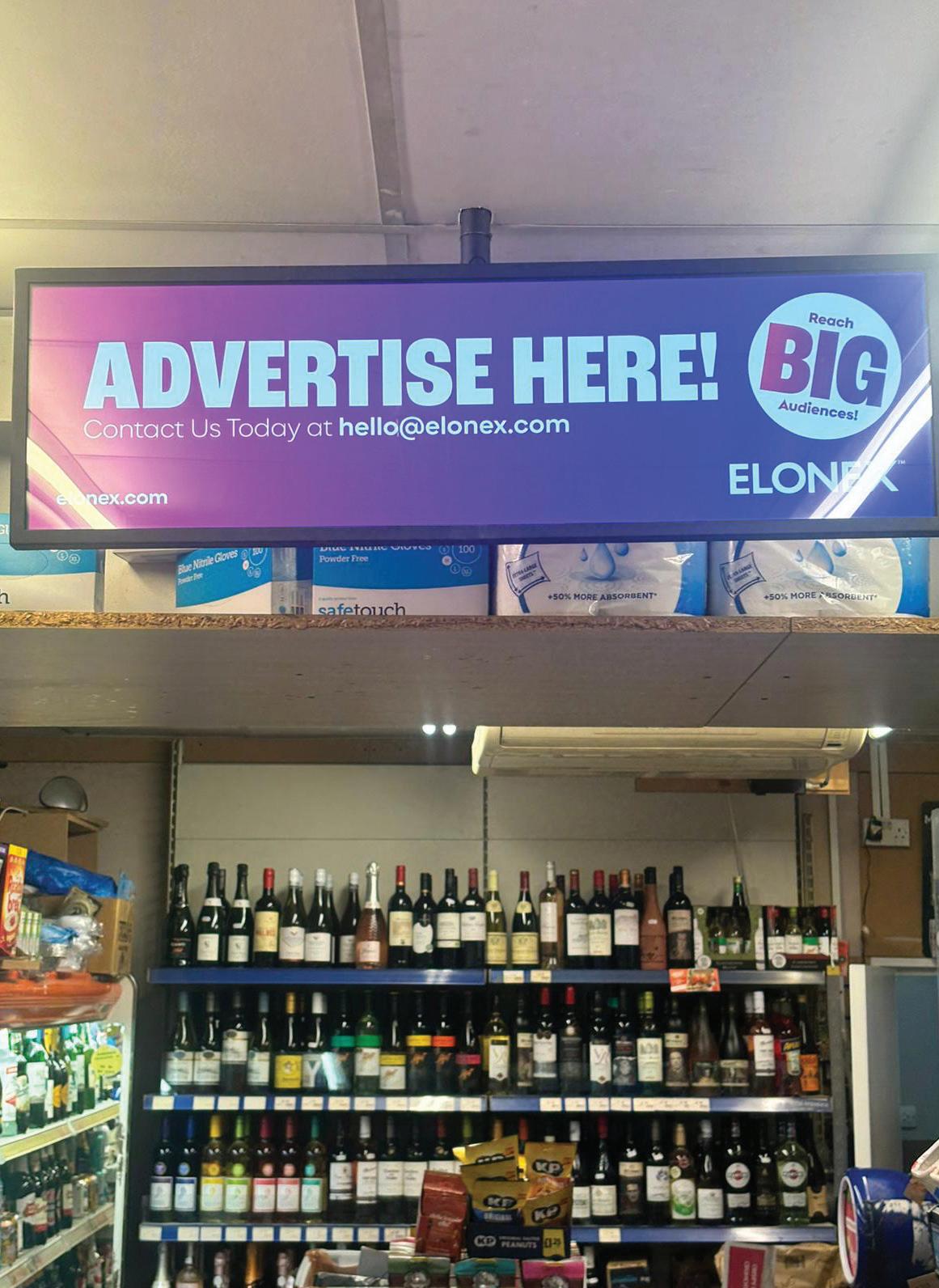
enue, with a percentage going straight to you. Elonex appreciates the unique convenience offering—where customers find everyday essentials and unexpected treats.
“This collaboration aims to celebrate and enhance the role of convenience stores as community hubs, offering valued essentials and exciting surprises that keep customers coming back.”
Elonex has more than 3,000 digital billboards throughout the UK including at major rail stations, music arenas, sports stadiums, shopping centres and motorway service stations.
l To make money from hosting a screen in your store, contact editorial@newtrade. co.uk with the subject ‘Elonex’, including your store address and mobile
Legendairy free-on-loan ice cream chest freezers are now available from Eastern European foods wholesaler Monolith.
The branded slide-open units, made in Ukraine, can be used to stock Legendairy’s 40-strong range of on-the-go and at-home ice creams.
As well as cones, sticks,
tubs and ice cream sandwiches, lines available include protein, healthier and vegan options and multipacks.
The moveable freezers are one metre wide by 80cm deep, and were described by Monolith as a “convenient small size to fit any store”.
Point-of-sale material
including posters and stickers are also available to help drive sales.
Current stockists include Morrisons, Spar, Nisa, Londis, Budgens, Costcutter and Best-one stores across England, Scotland and Wales.
The freezers come “with the ice cream range inside” when ordered
from Monolith, the exclusive distributor of Legendairy in the UK.
Described as “economical” in energy use, each freezer uses 1.7kWh per day – around 42p at current average energy prices.
Stores can enquire about receiving the offer by calling Monolith on 0207 5400040.
by Alice Brooker alice.brooker@newtrade.co.uk
Morrisons has introduced its More loyalty scheme into its Daily convenience format, with sources close to the company claiming a rollout into franchisees is due in the coming months.
A trial began in company-owned stores on 4 November, with the scheme offering customers reductions off specific products and points to redeem discounts. Several sources told RN it would likely be rolled out to franchisees from 2025.
One source said: “We don’t know much about it at the moment, but I know Morrisons has been looking to introduce loyalty into stores for some time.
“I assumed they’ll be rolling it out to franchisees once they’ve ironed out the issues in centrally-owned sites.
“I’ve been to various conferences where they highlighted Co-op bucking recent sales declines through their loyalty card.
“However, all Co-op stores are connected to the same EPoS, whereas you can have a choice of
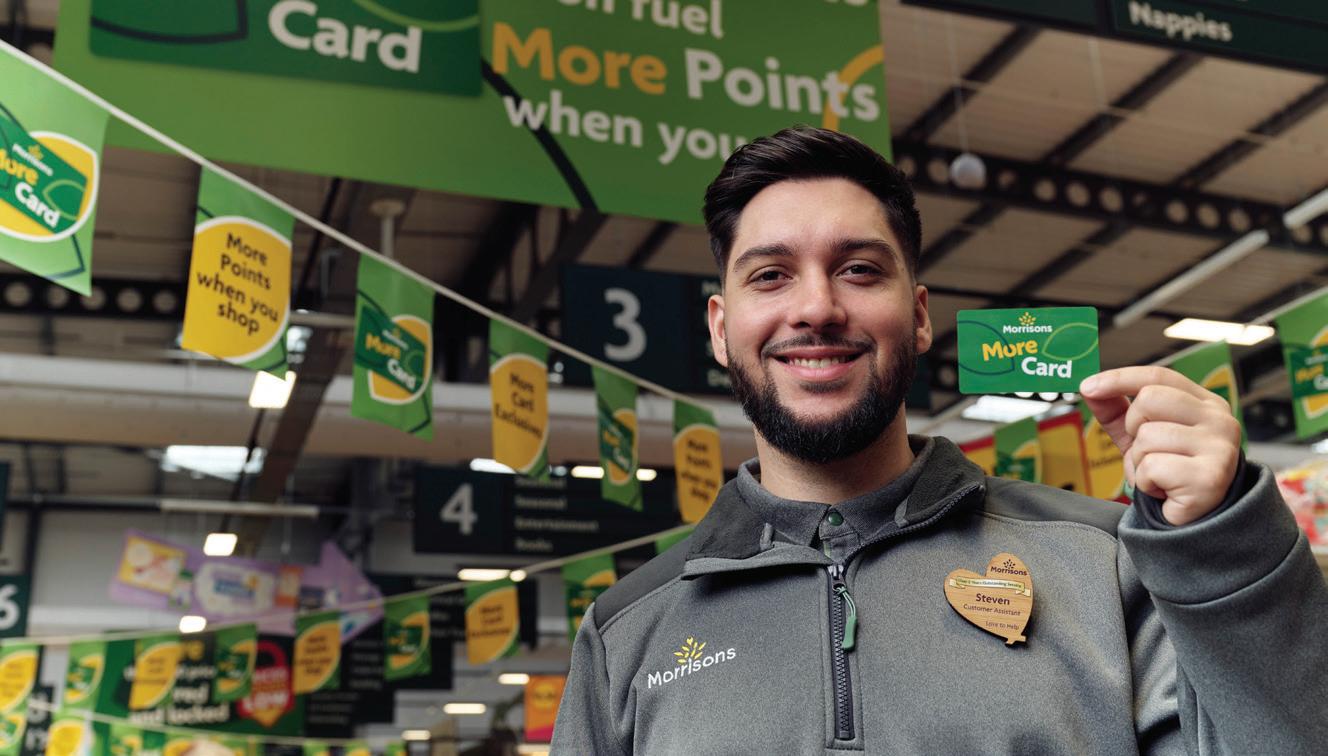
different ones as a Daily franchisee. We’re not yet sure how that will work.”
Another source added: “It is coming to Daily franchise stores, but we’ve not been given an official date yet. It will probably be next year.”
Morrisons Daily Wisewood in Sheffield, South Yorkshire, was one of the first stores to make the scheme available.
Posting on social media, it said: “We will be matching all More Card promotions that are live in larger Morrisons stores.
“For example, in our store, we have tins of Celebrations at £6 each or two-for-£10. In Morrisons,
they are two-for-£8 with a More card. We will match this price.”
Asked by RN to comment on the rollout, a Morrisons spokesperson responded: “We have around 1,600 Morrisons Daily convenience stores – 600 of which are franchise stores.
“We’ve just begun the rollout of the More card into our circa 1,000 Morrisons-owned convenience stores – excluding our franchise stores – which means More Card holders shopping in these Morrisons Daily stores will benefit from lower prices and being able to earn points.
“While we can’t yet give further detail on the wider rollout, our ambition remains to bring More into all Morrisons Daily stores, including our franchise stores.”
RN first revealed plans of the scheme last year, with the potential rollout into franchisees marking one of the first times a supermarket rewards scheme would be available to independents. Morrisons rival One Stop is also developing a loyalty scheme for its own sites, with several sources close to the Tesco-owned chain claiming plans would be revealed in more detail soon.
Retailers in Northern Ireland are to receive improved deliveries, as part of Savage & Whitten Wholesale’s (S&W) £15m investment into a new 183,000sq ft warehouse.
The company will double its delivery fleet as a result of the increased warehouse space. The expansion has also been supported by the installation of a Podfather logistics planning tool.
The system will enable S&W to improve its delivery routes, provide estimated-time-of-arrival notifications to customers and offer more detailed reporting on deliveries.
“Podfather will play an integral part in supporting our expansion, helping to build early foundations for increased efficiency throughout the business,” commented Clive Whylie, head of operations at S&W Wholesale.
Spar retailer Dan Brown has acquired full ownership of the awardwinning Pinkie Farm Convenience Store in Musselburgh, East Lothian.
Former Nisa chief executive Michael Fletcher is to become Spar UK’s managing director from 22 November.
It marks the first time the symbol group has had someone in the role since Louise Hoste departed in September 2023.
Fletcher was Nisa chief executive between February 2022 and November 2022. He was replaced by
Peter Batt. Fletcher has also held senior roles at Co-op and Tesco.
Commenting on his new position, Fletcher said: “Spar is a globally recognised and respected brand, and I am thrilled to join the team as managing director.
“I look forward to supporting the strengthening and development of
the brand’s proposition in the UK.”
He is also the founder and chief executive of Sleet Brush, where he focuses on designing and implementing solutions to retail and wholesale challenges.
Nick Bunker, nonexecutive chair at Spar Food Distributors, said: “Michael has outstanding credentials in comm-
ercial, retail and food sectors, with experience across various trading environments. His professional capabilities and high standards consistently drive excellent business performance and operational resilience.
“We are delighted with his appointment and look forward to his lasting and positive contribution to the Spar business.”
Brown, who took on management of the store in 2018, bought out the full share of it from the Sands family last month.
Brown said: “We’re excited about the next chapter for Pinkie Farm and look forward to deepening our ties with the Musselburgh community as we expand our offerings and further develop our services.”
The store switched from Nisa to Spar last year.
Pick Me Up (PMU) magazine has disappeared from shelves, with little to no warning.
The Future-owned title had an average circulation of 44,771 copies on the newsstand last year, which is likely to have declined to around 39,000 copies today.
The last weekly edition went on sale on 24 October, but the monthly PMU special will continue, next out on 28 November. It is the latest in a string of magazine closures by publisher Future, which is steering shoppers to PMU’s sister title, Chat.
Chat has an average circulation of 111,584 and costs £1.35 compared to PMU’s 99p. However, a page in PMU’s last edition contained vouchers redeemable in stores, lowering the price of the next five Chat issues to 99p.
Kennedy Publishing has acquired children’s magazine Andy’s Amazing Adventures from Egmont.
Based on CBeebies shows Andy’s Dinosaur Adventures, Andy’s Safari Adventures and new Andy’s Global Adventures, the monthly preschool title costs £5.99. It includes stickers, puzzles, stories and facts to support children’s learning, as well as a free gift covermounted with every issue.
Sophie Rowlands, licensing director at Kennedy, said: “We’ll be breathing new life into the title with engaging activities and exciting gifts, which we know will be a hit with young fans.”
by Dia Stronach dia.stronach@newtrade.co.uk
Stores supplied by Smiths News selling the Daily Record and Sunday Mail were underpaid for more than three months due to an error by the wholesaler.
A notice sent to customers on 28 October warned Smiths News customers that between 13 May and 25 August, they had received the incorrect pence-per-copy margin on issues of the Daily Record (MondaySaturday) and sister paper the Sunday Mail.
The notice failed to state how much stores were underpaid on each copy or how the error occurred, but a senior source told RN that retailers lost 1.8p on each copy of the Daily Record (Monday to Saturday) and 2.3p on each copy of the Sunday Mail sold in this period.
RN understands the issue does not affect any store supplied by Menzies Distribution.
Estimates by RN based on the titles’ newsstand sales in England and Wales, coupled with Smiths News’ market

share, suggest the error affected around 60,000 copies sold.
The error may have resulted in as much as £1,300 missing from retailers’ profits, but the actual number is likely to be lower due to the uneven regional demand for the Daily Record and Sunday Mail outside of Scotland.
A Smiths News spokesperson told RN: “The issue occurred due to an internal update where the new rate hadn’t been configured. Fortunately, our team identified this during our latest price update, corrected it, and ensured
alignment with the affected retailer invoices.”
The announcement of this issue sent out by Smiths News reads: “We are writing to you to give you notice that it is our intention to correct this error on your Weekly Summary Invoice dated week ending 2 November 2024. There will be one credit, which will cover all the issues affected.”
Retailers were told that a single credit would be issued to cover all of these errors, and would be labelled “Daily Record price correction credit” in the Miscellaneous section of their next invoice.
Brian Murphy, head of news at the Fed, told RN: “It’s good to see that things are being picked up when a mistake is being made.
“However, this kind of error should be identified and corrected more quickly in the future, and we hope that Smiths News don’t take as long.
“Even with a small error, it affects our members’ cash flow, which is incredibly important.”
The note to retailers from Smiths News added: “Please accept our apologies for any inconvenience which this may have caused.”
Industry sources have assured RN that the Financial Times’ (FT) decision to stop using i-movo digital vouchers is not a bad sign for the push towards digital newspaper vouchers.
Earlier this year, the FT quietly ceased offering imovo’s digital vouchers to subscribers. A statement on the FT subscriptions help page confirms: “We are phasing out the use of digital vouchers due to
changes in some of our business processes, which unfortunately means we can no longer provide the service.”
Speaking to RN, one industry source explained: “The FT has a small team, and a large proportion of their subscriptions are corporate. They didn’t want to have two different schemes going while they waited for a bigger rollout on digital vouchers. For a small team with a low
proportion of newsstand customers using vouchers, it’s twice as much work for not a huge saving. ”
This source added that a large-scale expansion of digital vouchers is likely to be imminent, with several supermarkets considering accepting i-movo digital newspaper vouchers for the first time. While acceptance of i-movo vouchers via PayPoint and Payzone is widespread in independent stores, the
absence of the service in major chains has been described as the biggest barrier preventing more publishers from moving to digital vouchers.
“That would tip everything towards digital,” they said. “I’m sure the FT will be back – with the savings involved, they would have no choice. At the moment, you still have to have the paper option taking up a lot of resources, but that is temporary.”
Head office
by Jack Courtez jack.courtez@newtrade.co.uk
Fed members challenged ministers and MPs to better understand the issues facing local shops during a Westminster meeting last week.
Several Fed attendees at the British Retail Consortium (BRC) event on 29 October met food security minister Daniel Zeichner, shadow business secretary Kevin Hollinrake and leading figures from the retail industry.
Speaking to RN after the event, Nilesh Patel, of Nils Convenience Store in Ilford, east London, said they managed to speak with “four or five” MPs about the core issues for stores – retail crime, business rates and wages.
Hemanshu Patel, of Saltwood General Stores in Hythe, Kent, added: “They said they understood what retailers faced, but the elephant in the room was clearly the Au-
Scotland
tumn Budget due the next day, which many retailers were concerned about.”
For Vince Malone, of Tenby Stores & Post Office in Pembrokeshire, the event was about the “long game”. He added: “Labour has a huge majority and nothing was going to change its plans for the Budget, but after this it’s time for Labour to change the message to look at opportunities.
“I said I want to invest and employ 18 people rather than the current 14, but I need to have confidence in and support from the government to do it.”
Asked for his opinion on the minister and shadow minister’s response, Malone told RN: “It was important to hear from Zeichner and Hollinrake that they have experience working in small businesses, but the environment has changed a lot since then, especially the cost of doing business.


“It’s a very different set of challenges, and the government needs to hear from and understand local retailers.”
According to the BRC, Zeichner’s speech at the event focused on “the need to protect shop workers”, and the “vital need” for moves to cut emissions and waste to also support businesses.
The trade group said
Hollinrake’s speech focused on “the scourge of retail crime”, business rates challenges and reforming the apprenticeship levy.
Major chains were also in attendance, with B&Q also calling for reform of business rates, Richer Sounds calling for reform of the apprenticeship levy and Ikea backing recycling initiatives.
Coca-Cola, Biffa and Sielaff are teaming up to run a deposit-return scheme trial in Fed national president Mo Razzaq’s Premier Mo’s store in Blantyre, Lanarkshire.
Speaking to RN ahead of the expected launch date of 11 November, Razzaq revealed the reverse vending machine, supplied by Sielaff, will take back plastic bottles and metal cans, paying shoppers 10p per container, funded by Coca-Cola Europacific
Partners.
The collections will then be picked up by Biffa.
It’s the second trial in Razzaq’s store; the first trial was in preparation for Scotland’s now-aborted standalone DRS plan.
Asked what the second trial would test, the national president responded: “Last time, the payout to customers was 5p, now it’s 10p. It’s still below the level we expect the official scheme to actually be, but it’s a lot closer, enabling us
to test what the impact is on shopper behaviour and on surrounding litter.
“I’m hoping to work with the local council, asking its teams to provide feedback on any changes in local litter.”
He added the trial should also provide retailers with advice prior to the launch of the official, UK-wide DRS launch in October 2027. “It’s smaller than the previous unit due to glass being excluded, but shop owners need to
visit and understand what it will mean for them.
“These units require space and planning, many think they will take returns over the counter but they may be underestimating the challenges that will bring.”
With three years until launch, the deposit level for customers, commission for stores, exemptions process for retailers as well as which group will launch and run the DRS all remain unknown.
Organisers have urged stores to attend the London Fed district’s trade show in Wembley next week, promising a host of opportunities.
The free event on 14 November at the Sattavis Patidar Centre in Wembley Park is open from 6pm to 10pm, featuring a range of suppliers, wholesalers and service providers, plus an evening meal.
Nilesh Patel, of Nils Convenience Store in Ilford, east London, described the event as a great way to pick up new ideas from stands and shop owners.
Dozens of suppliers are to attend. The show is open to members and non-members.
The call follows a successful trade show run by the neighbouring South East district in Canterbury on 24 October.
The Fed described last week’s budget as “some gains, but also some pain” that will leave members facing a “rough ride”.
The trade group said stores were likely to cut back on staffing in an attempt to balance the wage increase, resulting in longer hours spent by shop owners at the till and stacking shelves.
Highlighting that the increases come at a time of high bills elsewhere in the business, the Fed urged the government to recognise the “vital contribution” made by local shops by putting their concerns “at the top of the agenda”.
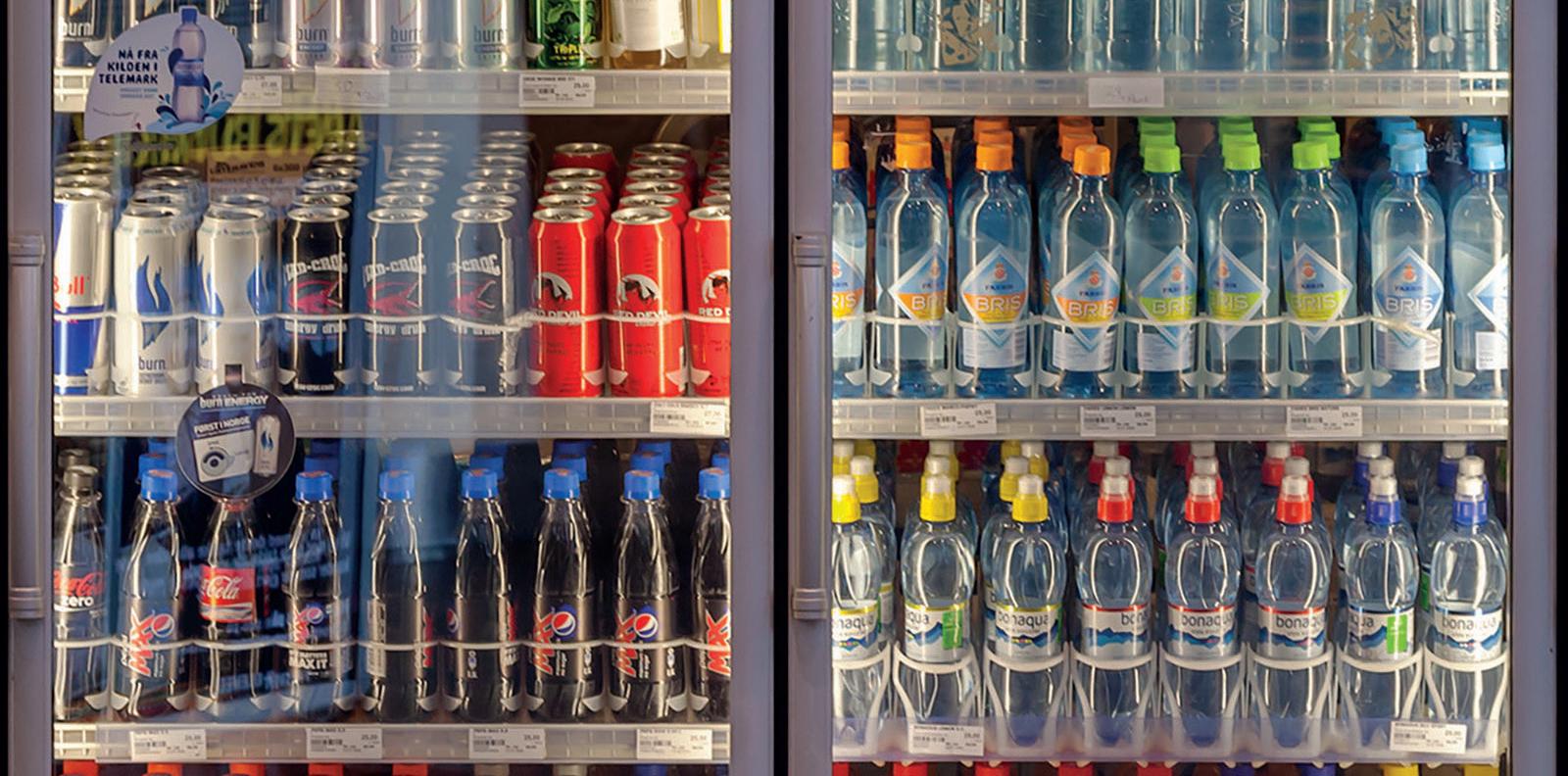
One of the doors on our Lucozade-branded double door chiller, which we have had since 2018, does not shut fully, despite it being replaced last year by a third-party contractor appointed by Scobie McKintosh.
The ownership was transferred over to us back in September because Scobie McKintosh advised us that Suntory Beverage & Food GB&I (SBF GB&I) was no longer placing chillers within retail stores alto-
gether, but no one from SBF has said anything to me, and they said it was news to them when I mentioned it.
There is a gap between our chiller doors, so we have to physically shut the door each and every time it is opened while our store is open for trading. You have to maintain a certain temperature, so it’s additional work that is also of high priority.
The issue here is that the door was not fitted properly in the first instance, hence the problem arose.
SBF GB&I has not been in touch since I met them
Pete Cheema, chief executive, SGF
The current legislative landscape is a busy one and, invariably, the impacts tend to land on the convenience sector.
Look no further than the UK government’s recent Employment Rights Bill, which will enable ministers to amend the law relating to employment rights across the UK.
Some of the key proposed changes at a glance include entitlement of first day Statutory Sick Pay (SSP) for ill

workers and removing the lower earnings limit for SSP; establishing flexible working rights for workers, except in some impractical circumstances; factoring in the cost of living when setting the minimum wage and removing “discriminatory” age bands; and ending the practice of zero-hour contracts in the UK.
We welcome the aim of the Bill in terms of protecting workers.
at the Better Retailing Awards just over two weeks ago.
They were supposed to have looked into getting us a replacement chiller, but thus far to no avail.
Bhavin Patel Tylers Green Stores in North Weald, Epping, Essex
A spokesperson from Suntory Beverage & Food GB&I said: “Every so often, we hand over ownership of chillers to customers, which means they become responsible for maintenance. The team have been in touch with Bhavin and connected him with local refrigeration companies to help resolve the issue.”
However, retailers strive to be good employers and for their staff to enjoy rewarding jobs, and these amendments may cause difficulty for retailers who are already going above and beyond in their employment practices.
Indeed, our Scottish Local Shop Report 2024 shows that the Scottish convenience sector provides more than 55,000 jobs across 5,220 stores, and that at a UK level, 98% of colleagues are employed on a permanent contract, with 83% feeling secure or somewhat secure in their jobs.
Where the challenge comes in, however, is that retailers are continually having to adapt the running of their businesses to adhere to the requirements of the steady

It was half-term and Diwali last week, but it hasn’t affected sales much. Not many people in my area celebrate Diwali, but I made a promise to one customer to show them what it is and share a post on social media. It’s a way for the community to get to know us.
Our recent spin-the-wheel initiative in store did really well, with customers having the chance to win stock from Coca-Cola. We’ll do that again when the stock comes along, but for now we are looking ahead to the festive period.
Pre-sales are coming through from Booker, but something we do struggle with is certain confectionery lines that just aren’t doing well anymore. The prices are mad and it’s killing chocolate. It’s not just that, but cigarettes, too – with the Budget recently, tobacco prices have increased by 10%, plus inflation. A 20-pack now costs £15 and a 30g bag costs £24. All these price increases are really making a dent in sales.
I’ve been reminded of how important consistency is in running a store. You need to know what your brand is, and keep offering it to shoppers – that is why you will get customers returning to your store. You may just know your brand, or it may be that social media helps to shape and advertise it.
flow of new regulations.
This Employment Rights Bill will add new processes that retailers will need to follow, and yet so many of them already go above and beyond for their staff so that they can have jobs where the hours are flexible and which allow them to balance family and caring responsibilities. That is because local retailers value their staff and the communities which they serve.
Scottish Grocers’ Federation will feed into related engagement with the UK government such as through the recently published ‘Strengthening Statutory Sick Pay’ consultation to highlight both the challenges and concerns from the Scottish convenience sector.
the Budget better or worse than expected for shop owners?
you expect your sales to rise next year?

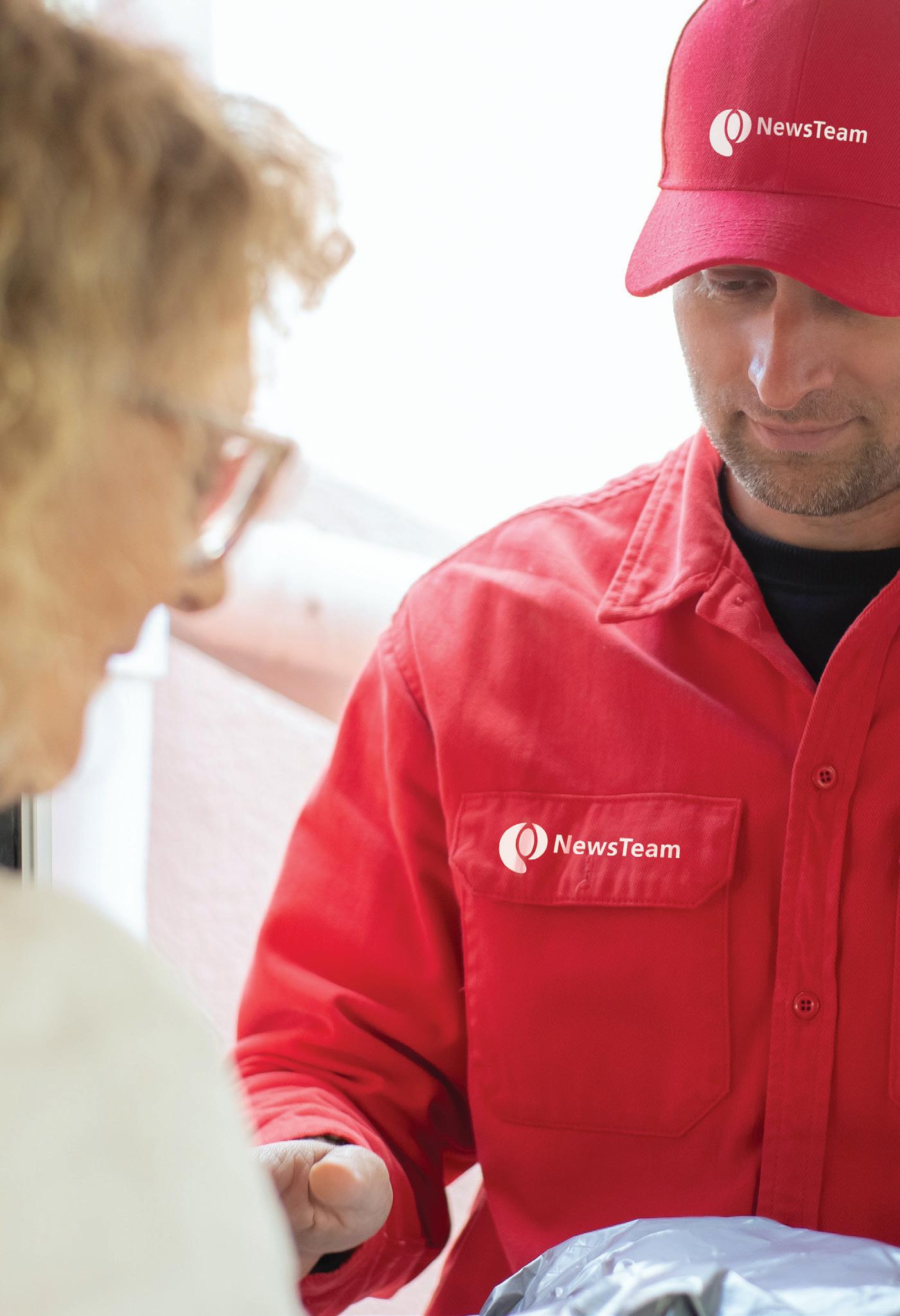


Pricewatch is the only price-comparison tool for independent retailers
See what other retailers are paying for bestsellers
Find out the average selling price in your region Understand both regional and national trends
Make sure you’re stocking the right products at the right price and redeem your 12 months’ free* access now:

1 Scan the QR code or visit us https://hubs.ly/Q02P565P0
2 Enter your coupon code Complete the form and enter your unique wholesale box number in the coupon field.
3 Sign up Add your card details – you won’t be charged for the first year.

4 Get the app Download the Better Retailing app from your app store.
5 Sign in to your app Go to the member dashboard and sign in to access Pricewatch as well as all the latest industry and product news.
for the first 12 months and then £96/year thereafter. Subscriptions can be cancelled at any time.
With real-time data from more than 7,000 stores, Pricewatch allows you to compare prices for the top 30 bestsellers across 14 core convenience categories
Optimise your shelf space
Stay competitive
Get more customers through your door






to find out more about product launches
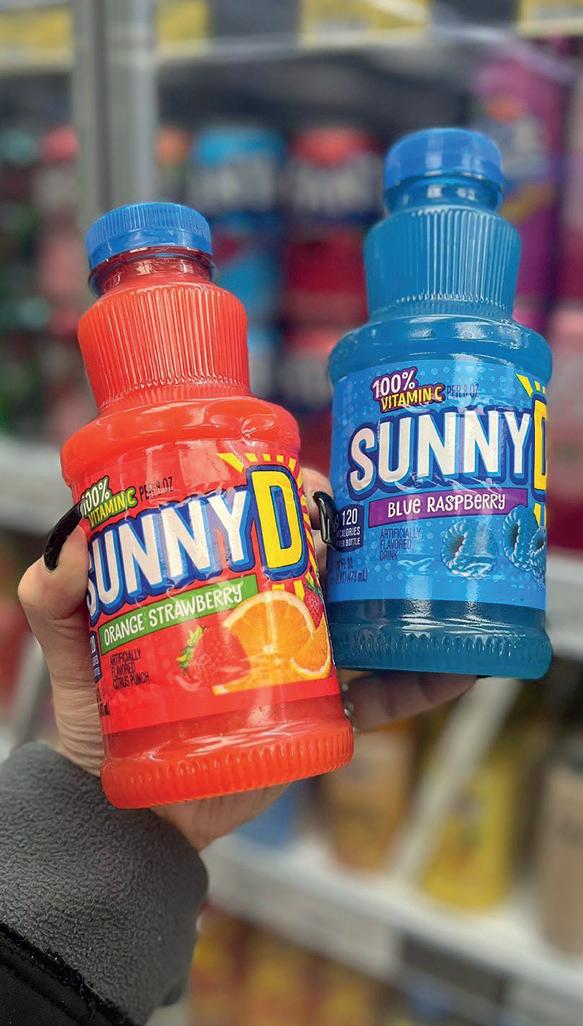
SunnyD (US varieties)
Recommended by: Sophie Williams, Broadway Premier, Edinburgh
Who buys it: Mainly workmen buying it with a bottle of water
RRP: £1.55
Why it’s important: People know we have a dedicated section for new products, so they know they can go straight there and get something they haven’t seen before
How to range it: We have a trending products section in the chiller
Where to buy it: World Candies, JGM Wholesale

Priya Khaira Features writer @priyakaurkhaira 020 7689 3379
priya.khaira@newtrade.co.uk
by Priya Khaira priya.khaira@newtrade.co.uk
Diageo has announced its latest Gordon’s campaign, ‘Mix it Up’, the first to feature Gordon’s Pink and Gordon’s Pink 0.0% together. The campaign is led by an advert running across broadcast video on demand, to show consumers choosing to pace their consumption by switching between the two varieties.
According to the supplier, the campaign has been created to empower consumers to moderate their consumption in a way that works for them. This is also backed by data from Diageo that claims 36% of drinkers currently pace their consumption with soft

drinks, while 49% of alcohol-free occasions also feature alcohol.
The campaign will be supported by social media and digital channels. The social media campaign will be led by the brand’s long-term partner, TV presenter Maya Jama. Tayara Sousa Linke, global head of marketing at Gordon’s, said: “When creating this campaign, we wanted to demonstrate that moderation
didn’t have to be a binary decision between having something alcoholic or alcohol-free.
“We know this perceived choice affects people’s decisions to moderate, so, through ‘Mix it Up’, we wanted to highlight that it’s possible to seamlessly switch between the two and enjoy the same great taste of Gordon’s Pink, while moderating with Gordon’s Pink Alcohol Free.”
Imperial Brands has launched three limitededition Rizla paper designs, which were created by a customer as part of a competition.
The Super Thin Silver papers form a complete image when placed together and feature an interpretation of Michelangelo’s sculpture David, with each version having a different colourful background.
The design was chosen from more than 580 entries submitted via In stagram for a global com petition, which reached an audience of more than two million people.
Each pack contains 32 king-size papers and is available to buy at an
RRP of 99p. Yawer Rasool, consumer marketing director UK & Ireland at Imperial Brands, said: “King-size slim papers seem to have lost none of their popularity with customers. That was one of the reasons we decided to add new limited-edition papers to the line-up – and ask our customers to come up with an eye-catching
new design, which would work with our established brand look.
“The design reflects the unique image of the Rizla brand, delivering the iconic look and feel, which continues to appeal to millions of smokers worldwide. We believe the trio of designs will definitely catch the eye of customers to pick up a pack – or even all three.”

Make sure you’ve got the right products at the right price on your shelves with Pricewatch, the only price-comparison tool for independent retailers. Free one-year access for RN readers – visit https://hubs.ly/Q02P565P0 to redeem your offer or scan the QR code.


Scandinavian Tobacco Group UK has launched its 2024 Henri Wintermans Half Corona limited-edition packaging. The new ‘Gentleman’ design evokes a pinstripe suit, with the logo and product information stitched into the fabric. The supplier said the brand is the biggest in the medium/large cigar segment and is the UK’s fifth biggest cigar in value terms, with annual sales worth £16.3m.
Available now
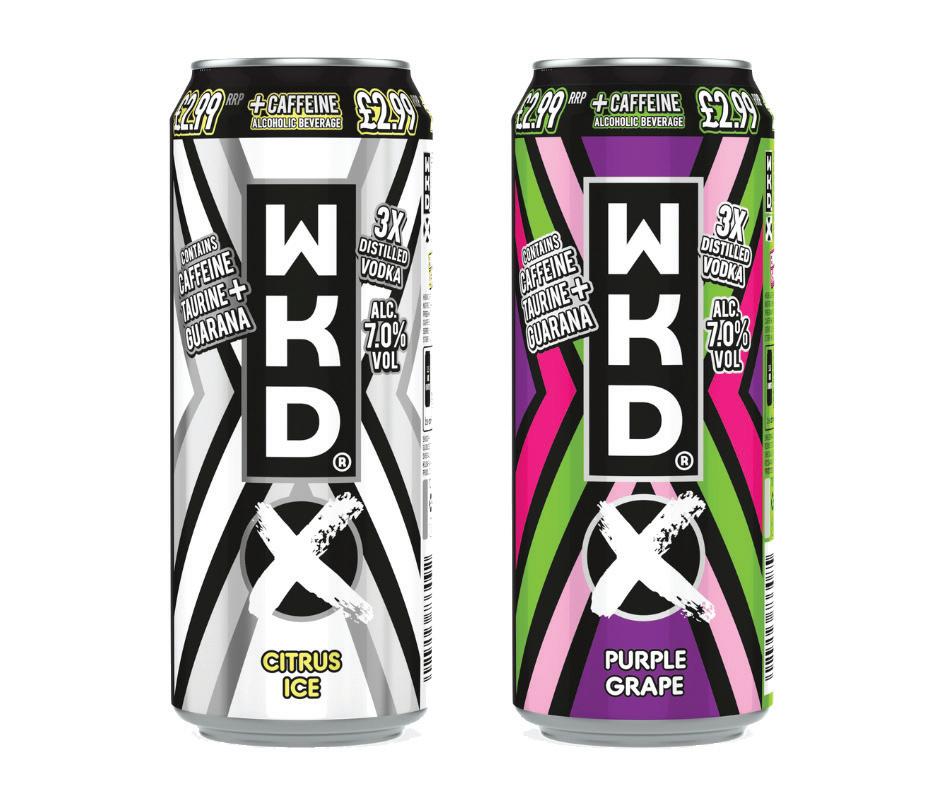
WKD has expanded its caffeine-containing WKD X range with the launch of Citrus Ice and Purple Grape varieties, backed by its first dedicated campaign. The two new flavours (both ABV 7%) are available in price-marked 500ml cans and join the existing line-up of Blue Raspberry, Mango Passion and Dark Berry. The campaign will be visible across 1,200 poster sites nationwide for three weeks into November.
RRP £2.99 PMP

Available now from Delice de France’s website is the supplier’s 2024 festive range. These include a Double Chocolate Santa Muffin, Gingerbread Muffin, Apple Pie Doughnut, Merry Cherry Doughnut and Shortcrust Mince crown. Retailers can also stock Puff Lattice Mince Pies and Mini Mince Pies. Delice is also launching a Pigs in Blanket Slice, a Breakfast Sausage Patty and Sausage & Cheesy Bean Slice. Contact delicedefrance.co.uk

Spar has launched a range of 1kg bags of Pick ’N’ Mix sweets with Uniflex, available in selected stores now. Retailers can stock two varieties – Jelly Mix and Fizzy Mix – which have a selection of popular sweets, including gummies, jellies and more. Jelly Mix features Lemon, Strawberry, Apple, Cola, Pineapple and Orange flavours. Fizzy Mix includes Strawberry, Sour Cherry, Cola, Orange, Pineapple, Lemon and Apple.
RRP £4.99
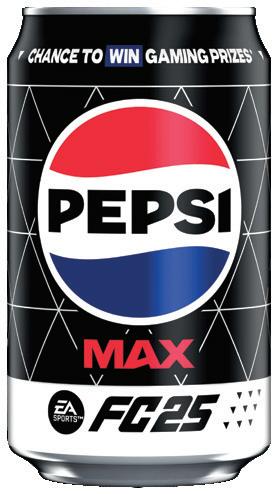
Pepsi has partnered with videogame franchise EA Sports FC for the second year running on an on-pack promotion, rolling out across all Pepsi 500ml packs and Pepsi Max 330ml cans. To enter, shoppers must scan the QR code on pack, where they’ll be directed to europe.pepsifc25.com. Here, they’ll need to sign up or log into their EA account and complete a form using the unique code found on the product.
Available now
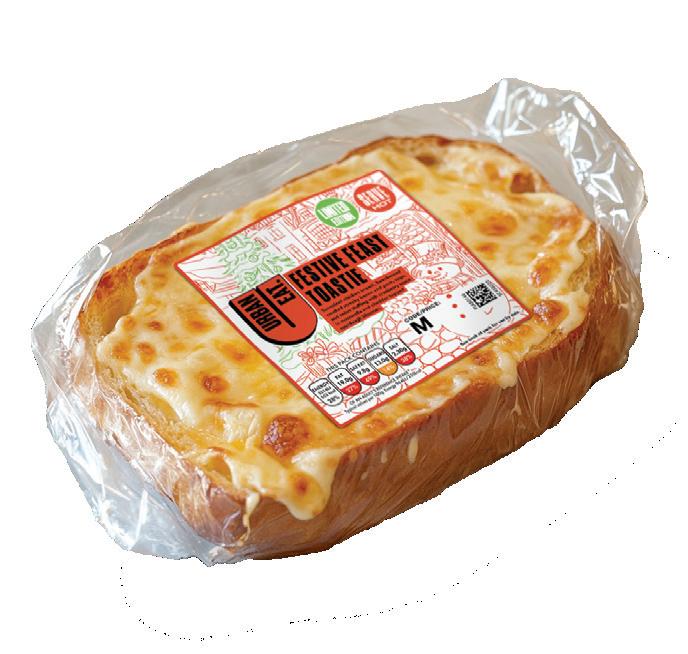
Urban Eats has launched a trio of festive food-to-go options. The three varieties are the Chicken and Turkey Festive Feast Sandwich, the Festive Cheese Sandwich and the heat-to-eat Festive Feast Toastie. The packs have feature hand-drawn illustrations and a scaled-back use of colour to stand out on shelf and evoke the festive spirit with shoppers on the go.
Available until 24 December
Research from distributor Paragon Brands shows that almost four in 10 young adults drink rum once a week, with sales up by 80% in the past five years. This week’s data shows the opportunity to drive margins on several established lines.
Seventy per cent of retailers are charging

STORE Costcutter –Fresh in Falkirk
above Bacardi Carta Blanca 1l’s £22.99 mostcommon price, with some charging as much as £30.99 – £1 higher than this time last year.
Additionally, 63% are exceeding Captain Morgan Original Spiced Gold 1l’s £22.99 mostcommon price, with £33.49 its highest price. This £10.50 price difference is comfortably the
Rum sells well all year round, with certain brands peaking in different seasons. Kraken, for example, performs particularly well over the summer. As we approach Christmas, we see a rise in demand for brands like Havana Club, or special editions. Captain Morgan, on the other hand, maintains consistent sales throughout the year. During the holiday season, customers are generally more willing to spend on spirits, whether it’s for gifts or for at home, so rotating the fixture each season helps keep the selection fresh and appealing.

largest out of all the lines this week.
The most rigidly priced large format is Dead Man’s Fingers Spiced 70cl, with 11% selling it for more than its £24.99 most-common price, with its highest price only £3.01 higher than that. Just 15% are going above Prince Consort 35cl’s £8.99 most-common price.
LOCATION Sutton Bonington, Loughborough 1,000q ft Village
Sales of rum have gone up a lot. It’s not quite the next big thing after gin, but it has increased. Customers are mainly young adults. We stock 11 brands, mainly ones you can get nationwide such as Captain Morgan, Bacardi and Kraken, as well as Sixtowns Rum from a distillery in Staffordshire. Captain Morgan sells well because it’s price-marked. The summer was brilliant for sales, but it is still selling well. Spiced types are good sellers for us, but Kraken’s Black Cherry & Madagascan Vanilla is also doing well.
Boost


Sharing chocolate tablets are an important part of a retailer’s confectionery offering. They give shoppers more value for money, and are a valuable sharing option for get-togethers in the run-up to the festive season. To help retailers achieve strong margins at good prices, we’ve compared pricing across five leading wholesalers
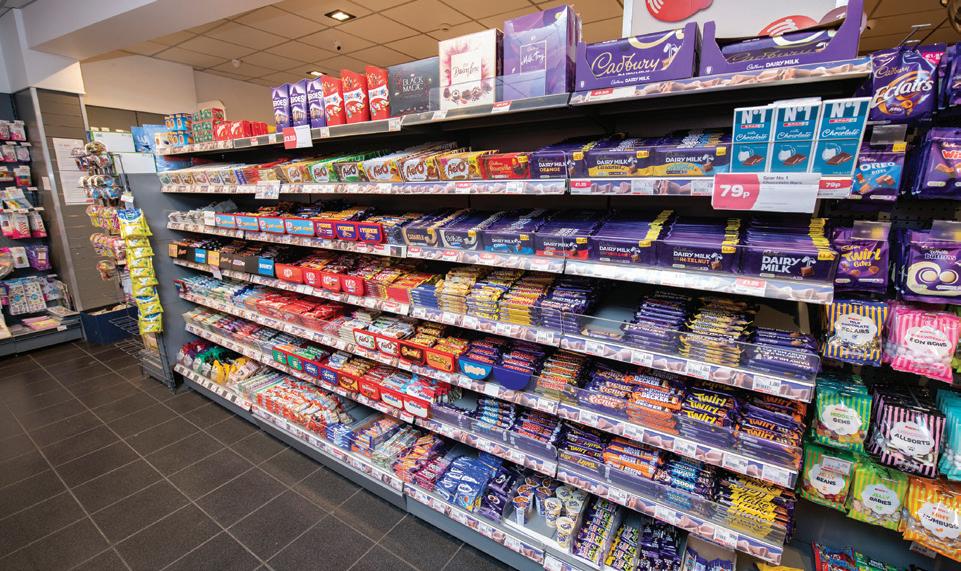
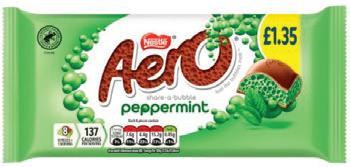

We’re always shopping around to keep up with the latest launches. We’re strategic with spending, especially on price-marked packs, as they tend to bring in good sales. We go to local cash and carries every other week to buy items on promotion, which can be a big benefit. If there is a promotion from Dhamecha, for example, we might make a 30%-40% margin overall.
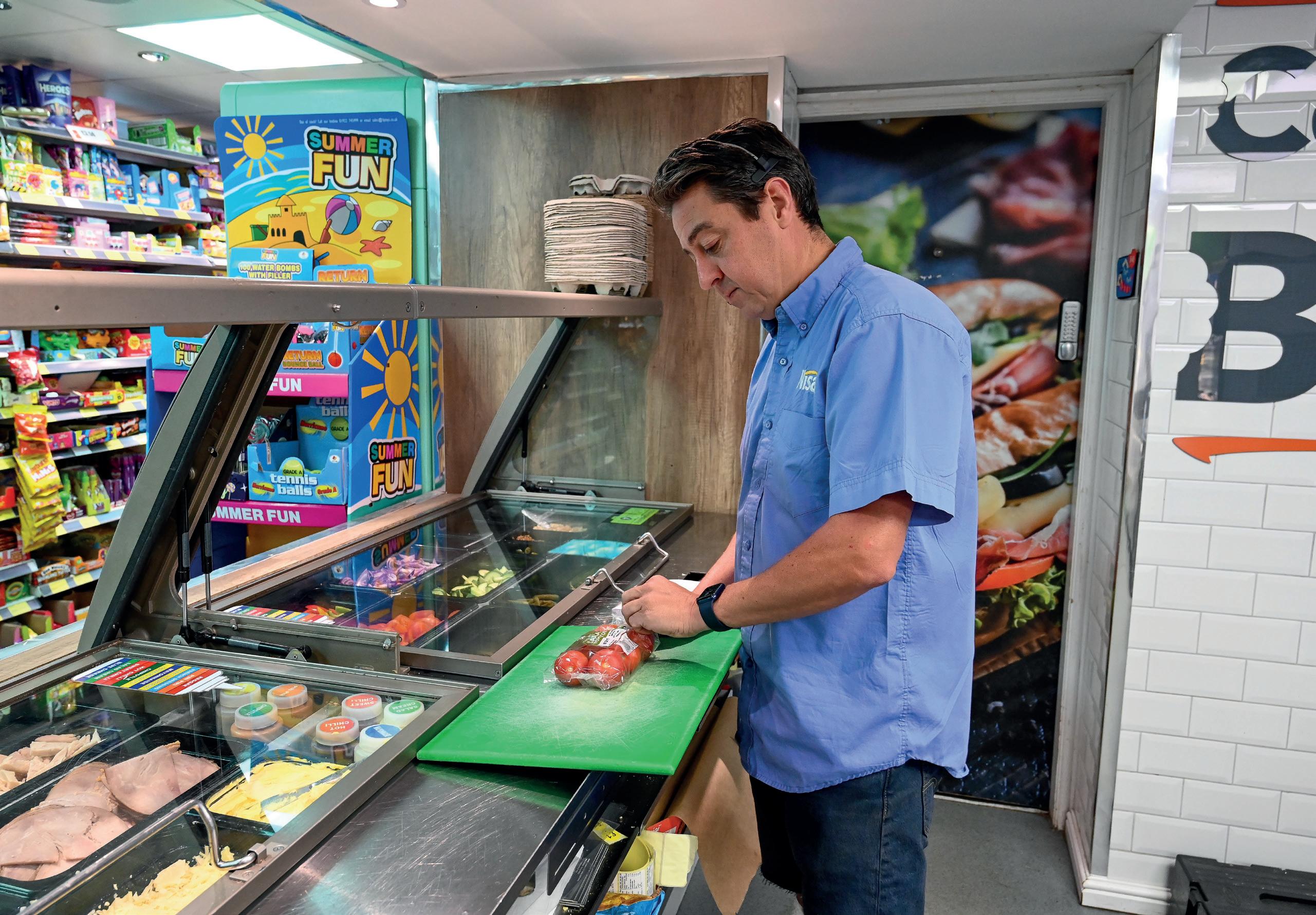
The RN team finds out what the benefits are of having specialist staff members on the team
Having specialised staff members doesn’t just provide retailers with the peace of mind that there’s an expert handling a certain aspect of the business. It’s also good for the staff members themselves who can feel themselves being trusted, empowered and developed.
“ The mentality around convenience is changing,” says Jack Matthews, from Bradley’s Supermarket in Quorn, Leicestershire which employs caterers for its award-winning
kitchen operations. “It used to be an industry where we’d employ anyone who could work. But now we want people who want to make a career out of it. We want people who are passionate about our business.”
Having staff who are specialised in a variety of aspects within the business, from vapes to food preparation to social media, also helps retailers to feel that, in an age of rising labour costs, the staff they are hiring are providing as much v alue as possible to their businesses.
“We’re aware of labour challenges and the cost of wages, so we want to get the most out of someone working with us and change the mentality of working in shops,” says Matthews. “It’s a challenge for the industry, so we’ve got to upskill people. I’ve no problem paying someone £12 a hour, but you need to get your money’s worth.”
To see what other stores are doing, go to betterretailing.com/advice
We want to change the mentality of shop work
JACK MATTHEWS
For Richard Johnson, from Pepper’s in Nottingham, finding someone to run the kitchen for his food-to-go offer was the hardest part of starting his business, but also the most essential to provide a unique selling point.
“We got a lady who’s spent most of her life in catering and she’s got a gift for cakes,” he says. “Her expertise has been invaluable and she’s trained other staff. It’s about getting the right person. We’ve always offered food to go, but she’s taken it to another level.”
This expertise allows Johnson to offer something different to the competition and draw footfall, and now food to go makes up a sixth of his overall sales. “It brings people in and they’re buying other things as well. Food to go has turned our weekends around and now our Sundays are awesome for sales.”

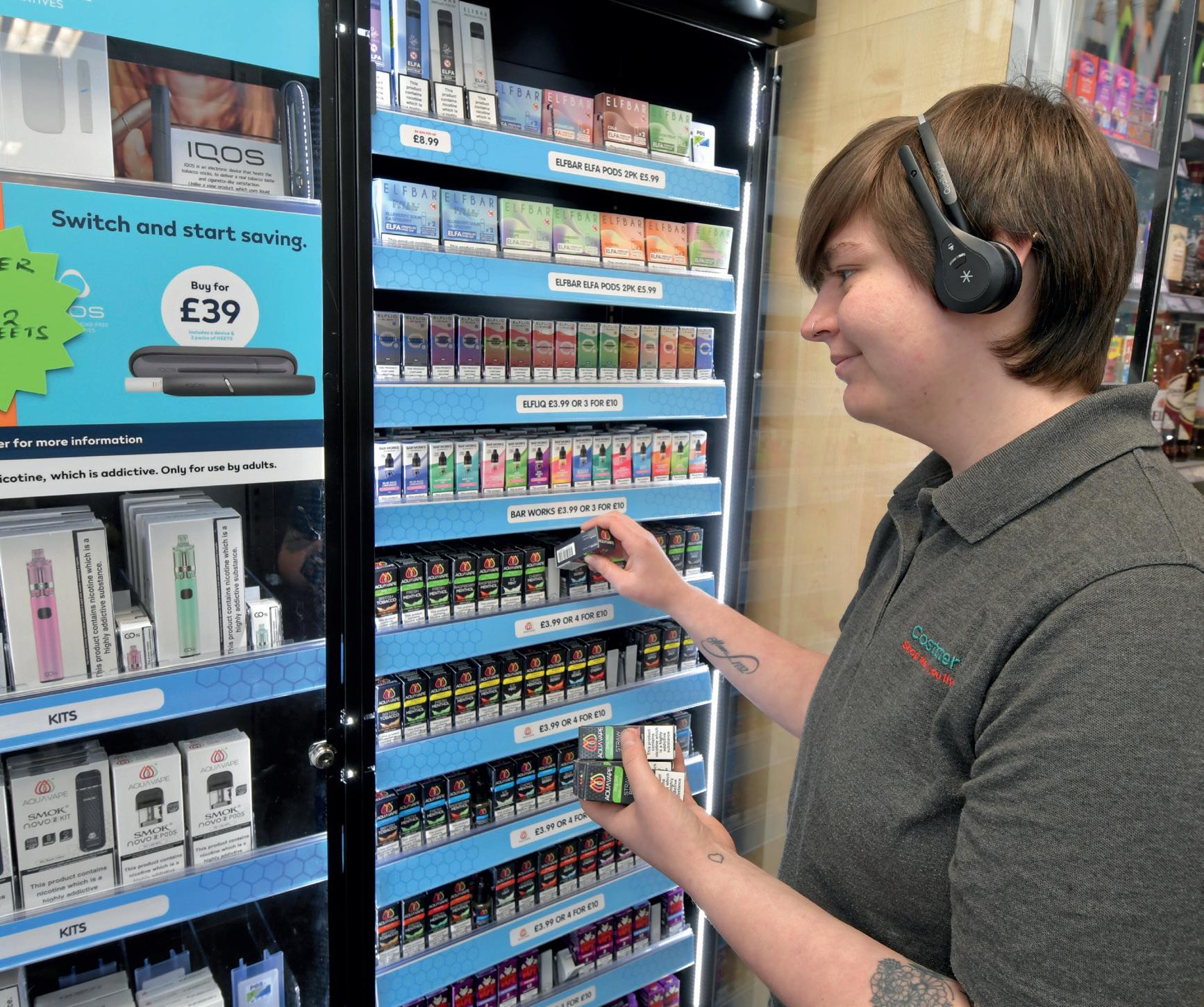
When Sue Nithyanandan, from Costcutter Epsom in Surrey, decided to get into vape three years ago, she knew nothing about the category. But one of her team – 30 Under Thirty finalist Sophie Nightingale – was interested and got involved in the talks with suppliers.
“We set up the vape with the planogram the supplier had provided,” says Nithyanandan. “She was very good at spotting what was selling. It was refreshing that someone was taking such an interest. We grew the category from nothing to £8,000 a week. Give people a chance and involve them.”
This trust has seen Nightingale grow into her role and she now heads the store’s security as well. Nithyanandan also has staff members specialising in the chiller, where 40% of sales come from, handling wastage and analysing EPoS data to make sure promotions are accurate.
Jack Matthews, from Bradley’s Supermarket in Quorn, Leicestershire, has specialised staff working in his kitchen for his food to go, which happened naturally as the offer expanded and became complex. He’s also looking at other training courses for team members, including wine qualifications.
“It’s not something we’ve done officially, it’s part of wider staff development,” he says. “But if someone was looking for a dry white wine, we’re not going to generate sales if the team isn’t passionate and educated.
“It would be good to have people who can point them in the right direction, and it would be even better if they could make a recommendation based on their knowledge. There are suppliers who’d be willing to fund the training. I’ve already done a level 2 qualification and there are definitely some people who want to do it.”
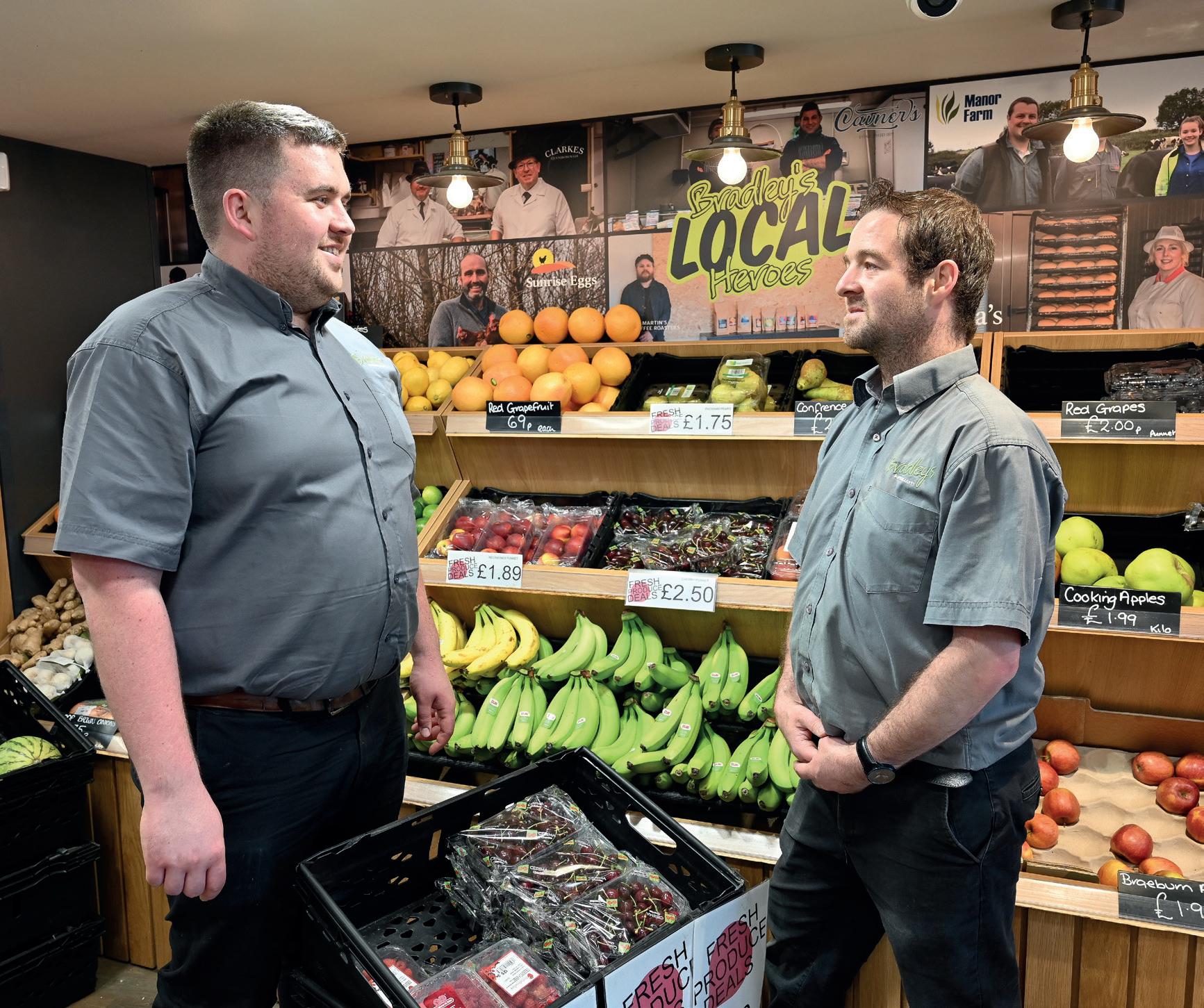
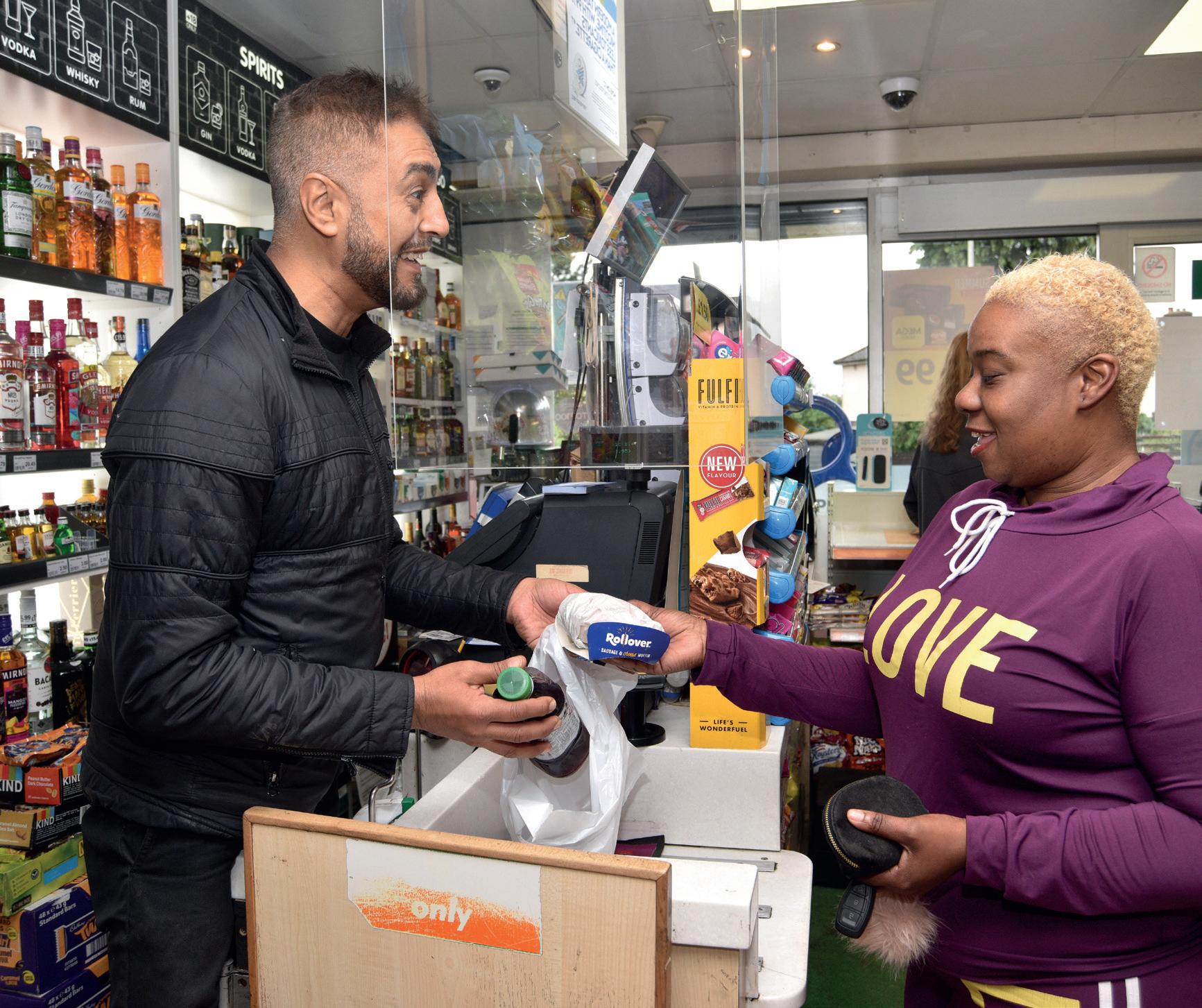
When it comes to empowering staff, Atul Sodha of Londis Harefield in Uxbridge, west London, believes in “leaning into whatever they’re capable of”. Sodha is the “face” of his store, but knows his team can help him with topics such as social media.
“If it’s something you’re interested in, you pay more attention to it, whereas with me it’s a time constraint,” says Sodha. “I can’t be everywhere.” One of his staff takes charge of the socialmedia strategy: “I’ve got her on a project where she’ll edit some videos I’ve done in store. I’m always capturing bits and pieces, but I don’t have enough time to follow them up.”
Sodha is hoping to hone her interest by sharing insights with her from strategy days and classes he has had with external companies, improving her skillset in an area she’s already passionate about. l

Many stores pride themselves on their customer service, but as Scott Annan explains, making it a true USP requires a plan of action

As the digital age redefines consumer expectations, independent store owners face a critical question: how do we compete in an environment where giants offer fast, impersonal convenience? For those seeking a competitive edge, the answer may be found in a return to ‘old school’ retail values with one-on-one customer service. Where so many sectors – such as banking and telecommunications – have stripped back human interaction, there exists a clear opportunity for local retailers to leverage personalised service as a premium offering.
This month, we explore the business benefits and profitability that can accrue from investing in and delivering personal customer service, even amid rising employment costs and operational constraints. While customer service has evolved in new ways with digital tools,
nothing can replace the impact of a genuine human connection.
Major businesses across all sectors have progressively cut down on direct customer service, opting for online-only or automated services. Banks and mobile phone providers, for instance, have significantly reduced face-to-face service, moving customers towards apps, websites, and call centres, often ‘staffed’ by chatbots or virtual assistants. This shift to digital interactions is justified by cost savings and the promise of efficiency. However, it can leave customers feeling neglected or undervalued, particularly if they have longstanding loyalty to the brand.
My recent interactions with a long-time bank and a mobile provider have been awful. After years of loyalty, it’s frustrating to
be redirected to automated systems that can’t understand my needs or concerns. These poor experiences demonstrate how impersonal service can erode customer trust and loyalty, creating an opportunity for independent retailers to fill this gap by providing real, one-on-one service. As artificial intelligence (AI) and chatbot technologies become more commonplace, there’s little doubt that personal service will become a premium feature. Something valued not only for its effectiveness in problem-solving, but for its human touch.
RISING EMPLOYMENT COSTS: THE IMPACT OF THE RECENT UK BUDGET
D elivering high-quality, personalised customer service involves an investment in people. Recent changes in the UK Budget have made this investment more chal-
lenging. The increase in employer national insurance contributions and the rise in the minimum wage represent significant costs to businesses, particularly operating in independent retail. This rightly prompts a hard look at staffing budgets, leading some of us to consider cutting staff or adopting more automated options.
Reducing customer-facing roles could be counterproductive in the long term. Better-trained, moreengaged staff drive better sales and create positive experiences that keep customers returning. Therefore, it is essential for retailers to focus on cost-effective ways to enhance customer service. This might involve investing selectively in training, incentivising staff to deliver exceptional service, or even rethinking store layout and operations to maximise the effectiveness of a leaner team.
One practical way to offset customer service costs is to increase gross profit by adjusting our assortment. Ensuring that high-margin items are prominently displayed and marketed can make a tangible difference to profitability. Furthermore, streamlining inventory by prioritising popular, high-margin products can reduce waste, create more focus for customers and provide additional funds to invest in customer service initiatives.
With a carefully curated assortment, we can enhance our gross profit margin, making it more feasible to maintain a well-compensated, customer-focused workforce. Offering in-demand products alongside attentive, personal service creates a compelling value proposition that draws customers away from larger, impersonal competitors.
Every store is only as good as its people. Great customer service drives not only one-off sales, but also builds relationships that lead to loyal, repeat customers. Skilled, attentive staff can suggest complementary items, encourage higherspending behaviour and resolve issues before they escalate, all of which contribute directly to a store’s bottom line.
Investing in high-quality customer-service training is a costeffective way to build loyalty. Simple techniques, such as active listening,
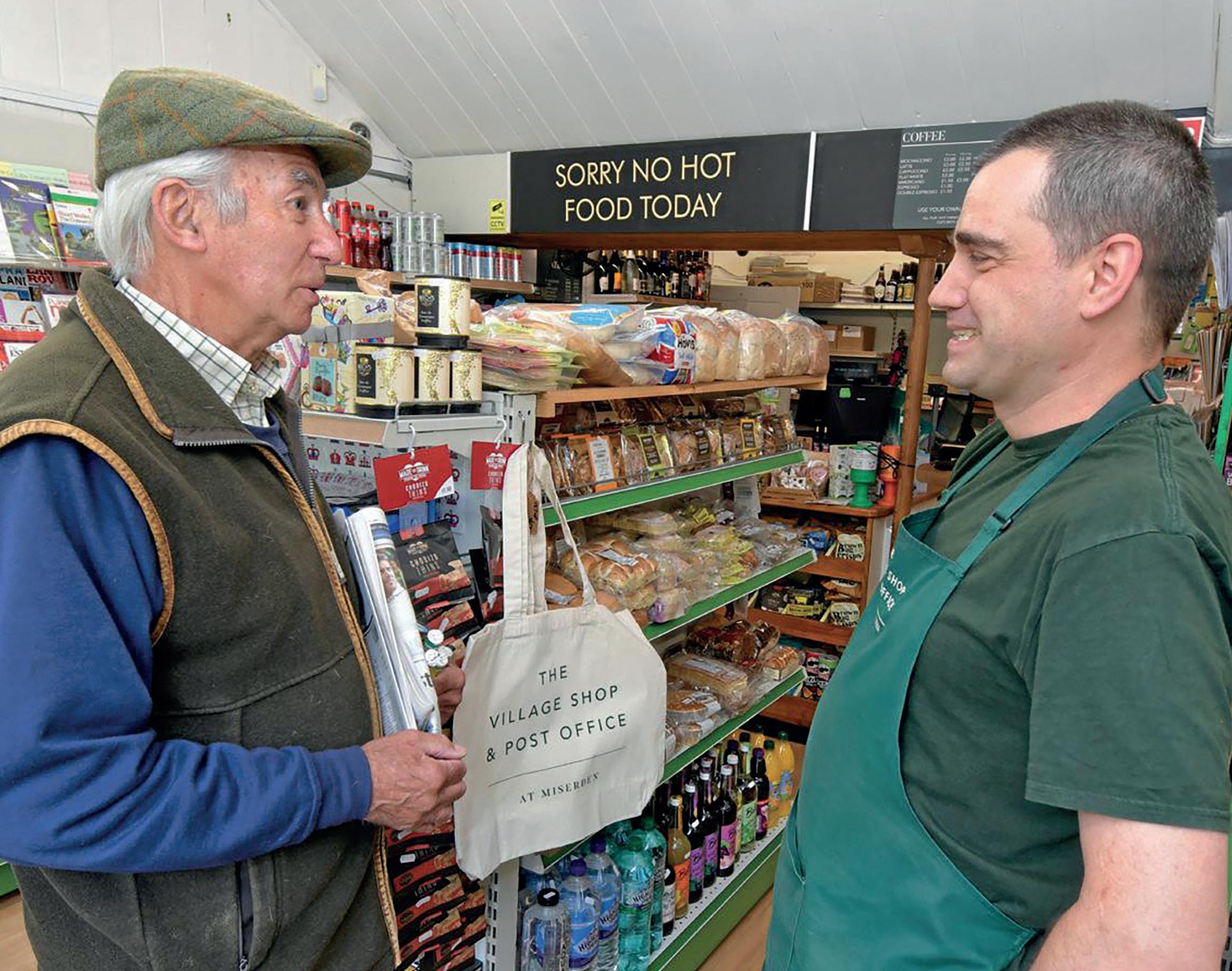
product knowledge and problemsolving skills, empower staff to offer more than a transactional experience. Moreover, staff who feel well-trained and valued are likely to be more motivated, which reduces turnover – a costly and disruptive issue for many businesses.
Today’s customers seek fast, reliable service, but they also crave authenticity, which can only be delivered by people. Customers want to feel that their individual preferences are recognised and that they’re seen as more than just another sale. Research consistently shows that customers are willing to pay more for a positive in-store experience.
For many of us, this means focusing on the details: greeting customers by name, asking after their regular preferences, and ensuring our team is visible and approachable. Whether it’s helping to locate a product or offering advice on new stock, personalised service adds value to each transaction.
Integrating personalised service is not without its challenges. To ensure consistency, it’s essential to have structured processes in place.
It’s essential to have structured processes in place
Standardised customer service protocols, such as greeting times and response techniques, can help provide customers with a dependable experience, regardless of which team member serves them.
We also must clearly define our value proposition. Personalised service is about identifying what makes our store unique and highlighting those aspects in every interaction. By defining what our store stands for, we can create a sense of identity that resonates with customers and builds loyalty over time.
As technology continues to shape retail, we have an opportunity to carve out a distinctive place in the market. The trend toward digital convenience may appear inevitable, yet it’s the very removal of human interaction by big brands that creates a competitive advantage for local, independent stores. Although rising employment costs are a reality, the potential rewards of personal service – stronger customer relationships, increased sales and higher margins – justify this investment.
Customers seek not just products, but connection, recognition and trust. l
Being a community-minded retailer isn’t just about serving your local customers. It’s also about knowing about the businesses you share shoppers with, the way t hey serve them, and how you can coexist with them. “It’s all very well being insular, protecting your own and not helping others, but if you don’t keep the other shops going as well, nobody will come to your store because they won’t come to your high street,” says Trudy Davies, of Woosnam & Davies News in Llanidloes, Powys.
For Davies, working with local businesses doesn’t just mean stocking local products. It also means
presenting a united front to foster a favourable trading environment. “If we run out of till rolls or something like that, we help each other that way,” she adds. “If somebody’s short of supplies, we help each other.”
Knowing your local businesses not only presents opportunities to provide a point of difference with their products, but also allows you to have a say in your area’s economic development through formal and informal partnerships, and helps to tackle retail crime.
A PRODUCT POINT OF DIFFERENCE
“A starting point for partnerships is local manufacturers and suppliers, which we massively encour-


age retailers to do,” says Mike Igoe, founding partner of convenience consultancy C-Store Collective. “We worked with CK Foodstores in south Wales, who fly the flag for local suppliers on their current leaflet campaign. They feature 20 in the edition.” Most retailers will have an opportunity to stock some form of product that is produced within a few miles of their store across any number of categories, although the breadth of products available will vary depending on the region.
“Everybody thinks their county is unique, but Cornwall does have a lot of products that are a bit special,” says Judith Smitham, of Pydar Stores – The Old Dairy in Truro. “It’s easy for us to stock Rattler cider, Tribute ale or Rodda’s Clotted Cream. We’re very lucky that we can feature these products. At the moment, there’s no Rattler Zero in super-
If somebody is short of supplies, we help each other

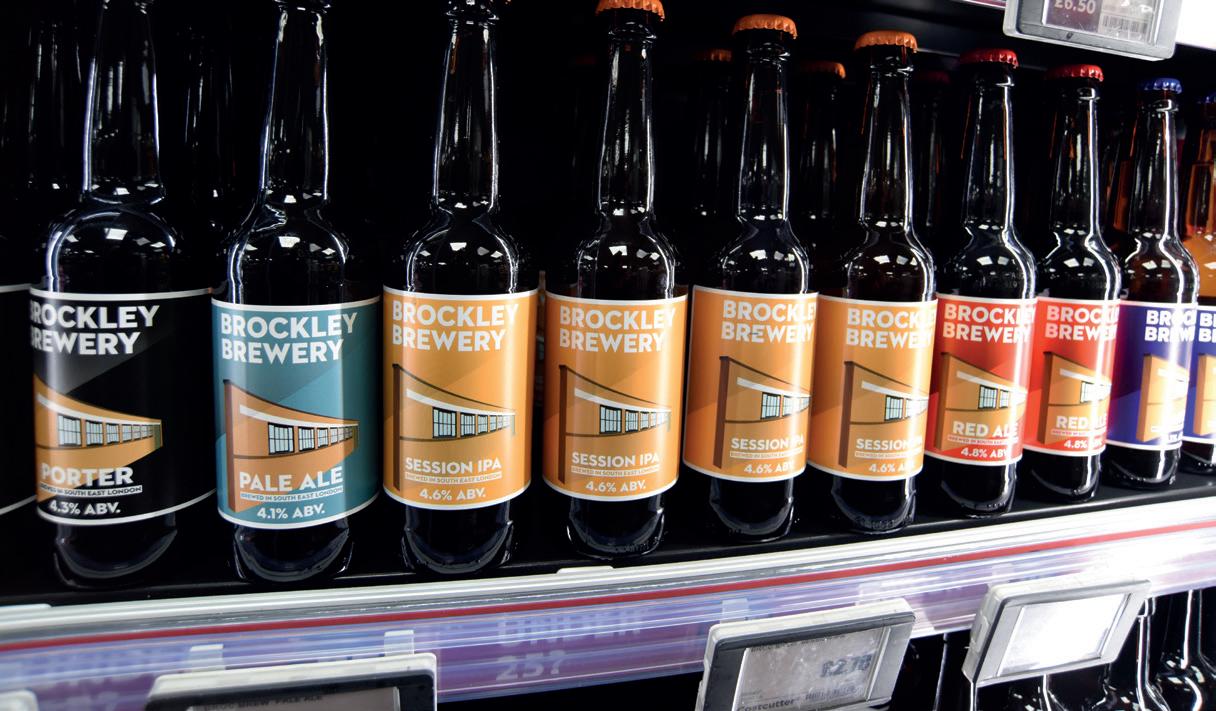

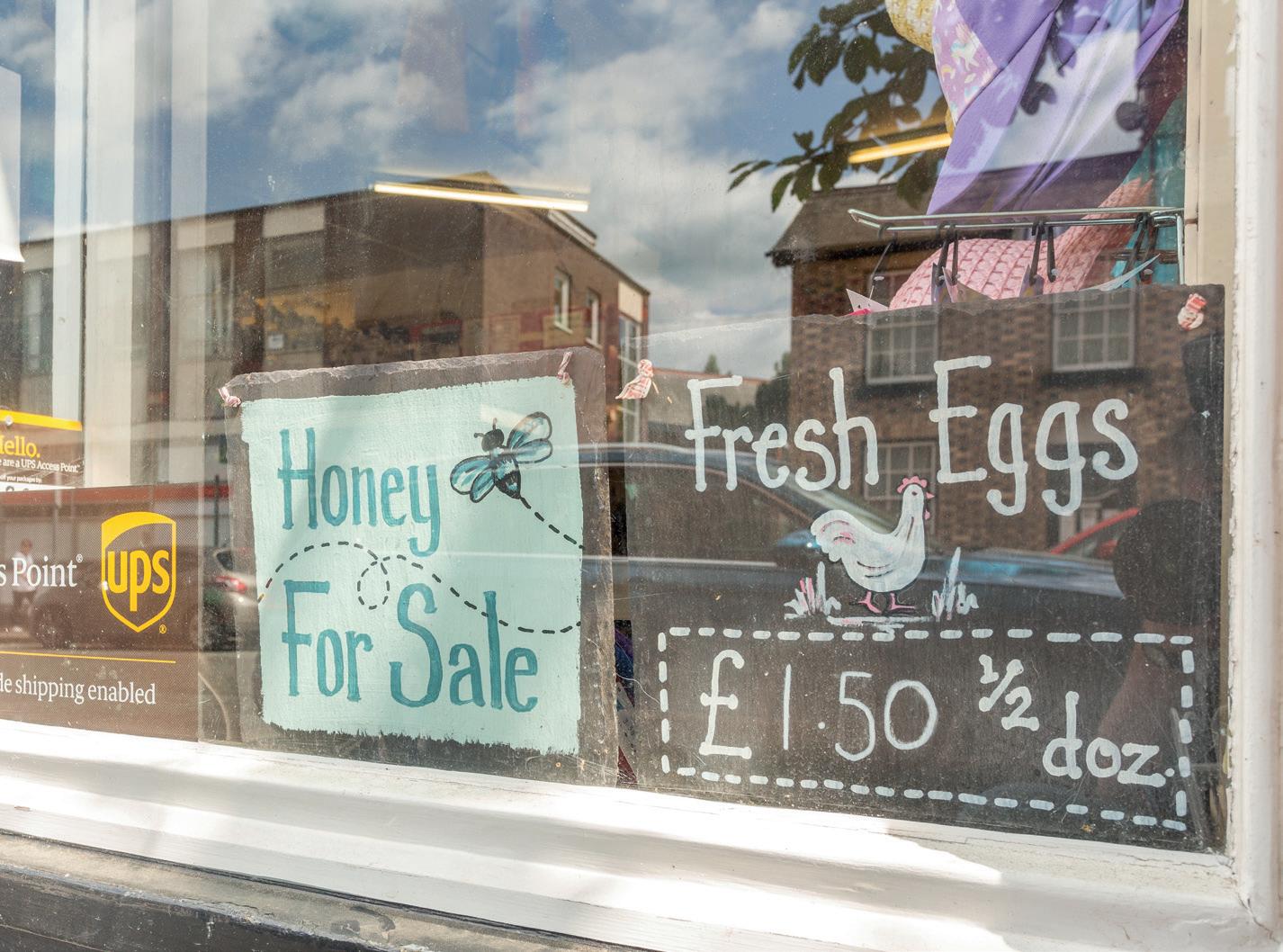
markets, but we can go to [brewer] Healy’s directly and get it.” Meanwhile, Davies goes hyperlocal, stocking pies from her town’s butcher and getting honey from a one-man business in a nearby village.
Working with local suppliers means it’s also easy to shout about them through events and tasting sessions, which can be simpler to organise than those with larger national suppliers as you’ll often have a direct line to the producers. Dilmeet Singh, of Londis Gerrards Cross in Buckinghamshire, hosted an event this summer where his local suppliers set up stalls outside the shop for an afternoon. “It was as simple as that,” says Singh. “They have all worked with us for a long time, so I though it would be a good idea to bring them together, it was a long time due.”
Anniversaries or milestones provide a good opportunity to highlight these partnerships. Kaual Patel, of Nisa Torridon in Hither Green, south London, hosted a similar event back in May to celebrate his store’s 40th birthday, at which local suppliers were in attendance offering samples to shoppers. The jewel in Patel’s local-offering crown is his Torridon Mosaic Pale Ale, made by the nearby Brockley Brewery, which is only available in his store, produced in a limited run with a can design inspired by a mosaic that was laid on the pavement in front of his shop.
“Customers love that we have something with our own branding on it,” Patel said after the event.
“We’ve been working with Brockley for a long time and we wanted something close to our heart.”
BEYOND FOOD AND DRINK
Retailers needn’t limit themselves to just stocking local food and drink, however. With a Spar practically next door to her, Davies needs to distinguish her offer in any way possible. One such way is greetings cards from a local designer. “They’re a little bit more special than what you normally find on the high street, and a little bit more pricey, but it means we’re looked upon by customers as having a good selection and something unique,” she says. Margins can go as high as 40% for these cards, and Davies’ cashflow for more standard convenience products is unaffected as she only pays for what she sells.
Miriam Al-Bazz, from Stannington Road Post Office in Sheffield, has gradually expanded her offer based on a relationship with a local photographer. “It started off with a few cards and grew from there,” she says. “Eventually, we got a stand for them, now we sell magnets, cards and calendars all together.” Al-Bazz also reserves some counter space for a pocket guidebook to walking the local Rivelin Valley area.
Davies encourages an open mind when thinking about which local businesses to partner with: “As long as everything we sell has got ingredients on the labels and is up to trading standards and food and hygiene inspections, then I will gladly

Customers love that we have something with our own branding
Dilmeet Singh
Londis Gerrards Cross, Buckinghamshire

We’re in business WhatsApp groups for the Gerrards Cross community and we are a part of the Disc app. If someone spots an offender, they can post their picture on it, so we can all see who they are and be aware of them. That’s a local council initiative, pushed by all the retailers in the area.
We have events where businesses get together – there was a Diwali event recently. The leader of the WhatsApp group promotes our business on the group, he tells members we’re stocking certain products and members come to our store and buy them from us.
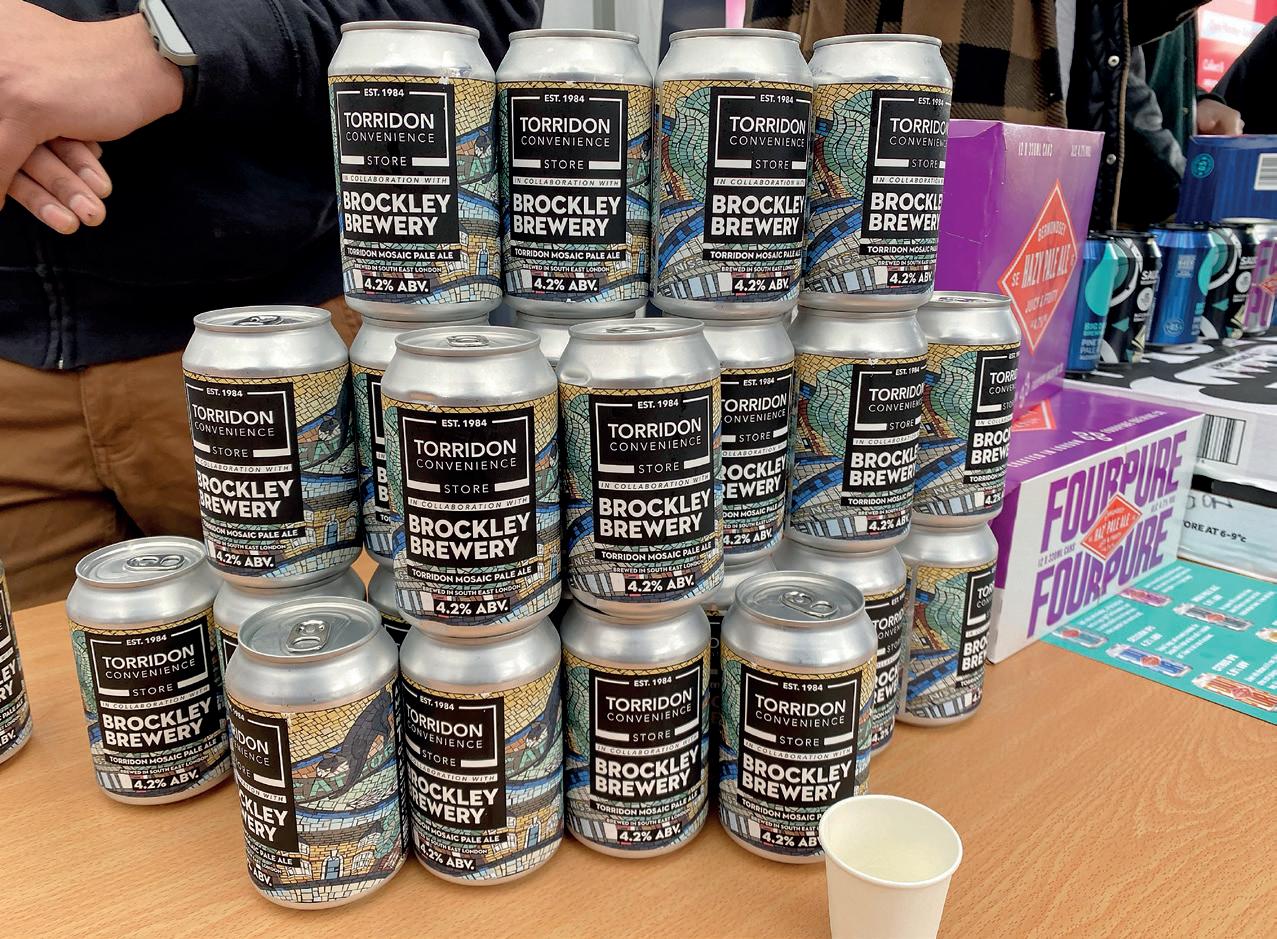
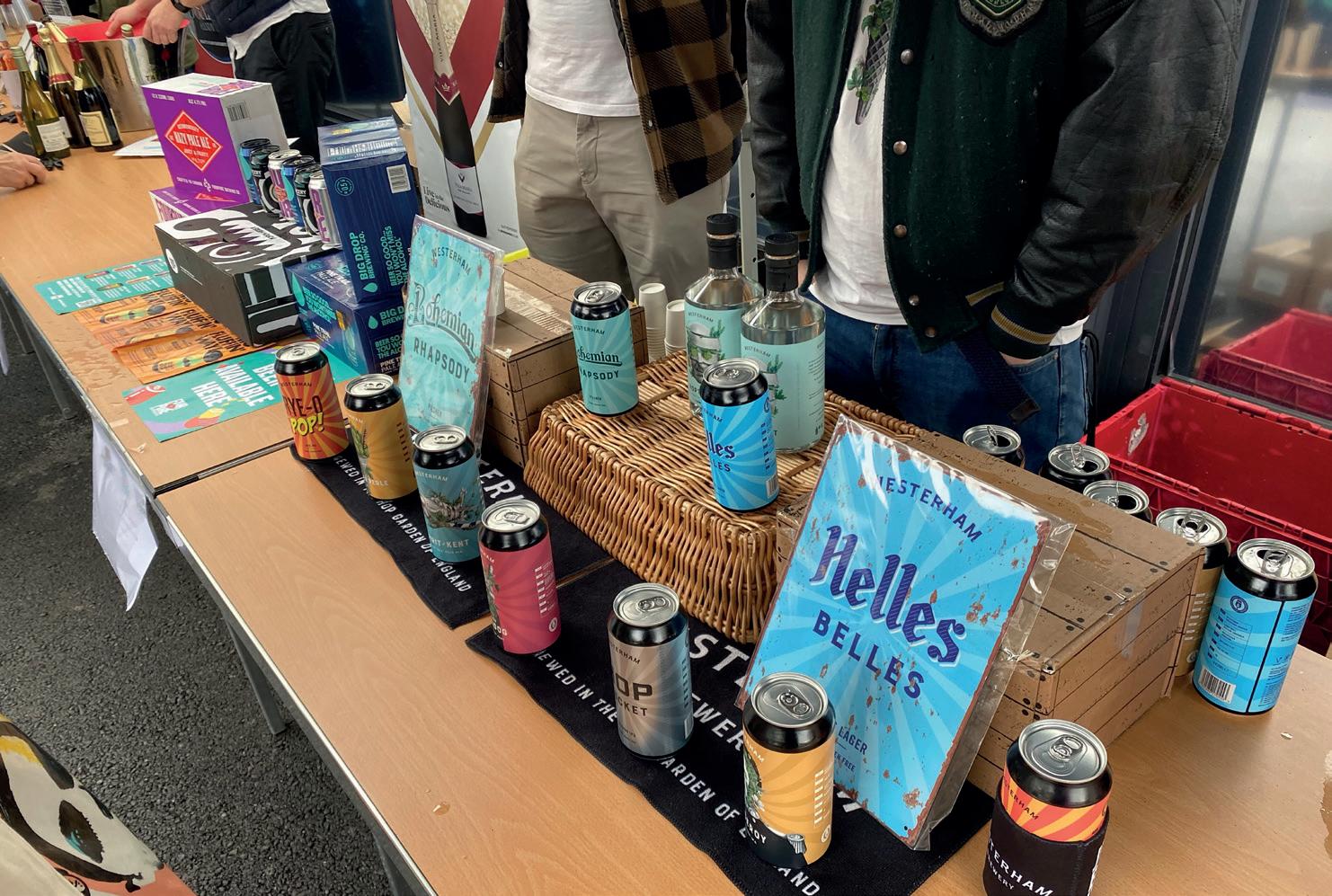
help any small trader.” She is also hanging a painting by a local artist in her shop window, highlighting that they are open to commissions and also thinking about how to accommodate some of their smaller artworks in her store.
Being chatty with your customers is also a way of potentially garnering new business, says Al-Bazz: “They like to know what’s going on and like relatable things. If you talk to them about something they find some link to, it promotes them to buy it or get to know more about it, and maybe they might have a business of their own they’d be interested in putting in our shop.”
Retailers shouldn’t just think about how partnering with local businesses can benefit their own reputation and bottom line; being part of a business community can help enrich an entire area, creating a more prosperous trading environment. Part of this is through col-
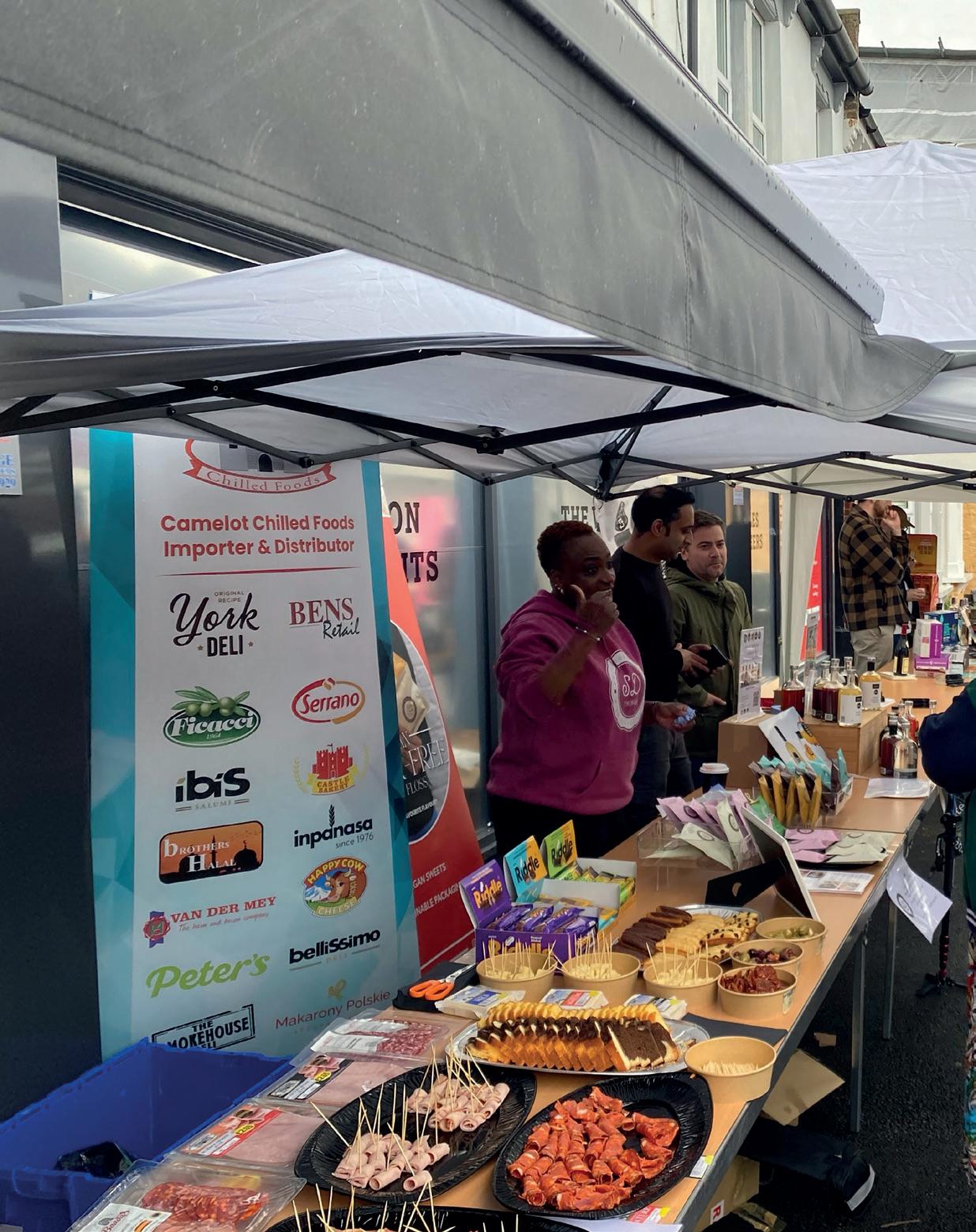
laborating where possible on efforts to mitigate the impact of criminal activity. “Within the area they are trading, there will be numerous other operations around them, so it’s highly likely they’re all dealing with the same clientele,” says Igoe.
“It’s really important that they share information, particularly around incidences of aggressive behaviour or regular shoplifters and work closely to keep local authorities informed of those activities. A single store making representations to the police about incidents has an effect, but a whole group doing so has much bigger clout in terms of getting the police to engage. It’s something we encourage because we know it works.”
Mike Lakhani, of Premier St Mary’s in Southampton, is part of a citywide WhatsApp group of businesses dedicated to alerting each other about crime. “If something happens in one store, they can alert someone straightaway and everyone’s on their guard,” he says. “Last
It is important they share information about incidences of aggressive behaviour
week, there was a fake £20 note in some stores two miles away, and the same gang turned up at my store on the same day, thanks to the group we were able to stop them from trying it in our store.” Lakhani says it’s important to keep crime-prevention groups on message to prevent them getting overused and ignored: “It’s not a chitchat group, there might be three or four messages in a day or none.”
WhatsApp isn’t the only means of getting in touch with other businesses. Singh and Smitham both use the Disc app, which shares information between participating businesses about known offenders and allows businesses to submit incident reports and send messages to each other. Smitham’s shop also has a Shopwatch radio that is connected to 60 other businesses in the city. “Someone at Poundland might say, a troublemaker has been in and is heading up towards us and they can send a description,” she says. “That sort of thing is happening all day long.”
Being part of a Shopwatch scheme or signed up the Disc app is a good way of compartmentalising your crime-based communications, leav-

ing other channels such as social media open for more informal discussion with other businesses.
Retailers should look to see how they can work with other businesses to make sure they are all operating at their peak. A rising tide lifts all boats, so the saying goes, so finding ways to make sure your business is working towards common goals with others in the area is a good way of safeguarding your shop’s prospects. One simple way of doing this is knowing the stores in your area and letting people know about them.
“If we can’t accommodate our customers, we know somewhere on the high street we can send them to, and we do it on a regular basis,” says Trudy Davies. “We’re not a ‘We don’t have it’ store, we’re a ‘Have you tried X up the road?’ store.” In her eyes, this attitude is all about supporting economic prosperity: “It’s all about looking after each other, because the more shops you’ve got on your high street, the more people visit your high street.”
Smitham has actively used her store’s social media to promote products and events at a coffee shop down the road out of a desire to help

local enterprises. “I thought she had some really special products, that you might see in a lovely farm shop, and she started doing cheese and wine tasting evenings,” she says.
If we can’t help customers, we know somewhere on the high street to send them to
“We’ve really liked what she’s done, and she has said thanks for promoting her. I’m always careful that we don’t stock anything that would interfere with her. She stocks locally produced brownies, and when we got a Facebook message about ours not being produced in Cornwall, I said she was using a local supplier, and we didn’t want to interfere with them. That got a few likes and she responded favourably, it has worked very well.”
There are also more formal business partnerships retailers can get involved in. Al-Bazz is a member of Stannington’s Economic Recovery Fund, which helps promote local businesses through initiatives such as a treasure hunt, and has regular meetings. She has also been putting up bookshelves for a take-one-leave-one community library across various businesses in the area, encouraging locals to visit different stores.
Smitham pays into Truro’s Business Improvement District – albeit out of obligation thanks to the city
council – and is able to send staff to meetings about various subjects hosted by other businesses. “There might be a cybersecurity meeting, for instance, or talks about problems in the city with antisocial behaviour,” she says.
These meetings present an opportunity for staff development, she adds: “I’ve got a junior member of staff who loves going to the meeting, taking notes, feeding back and getting a sense of inclusion in the workplace. That’s really valuable.”
Retailers could also look at ways to promote loyalty across local businesses with redemption schemes or discount schemes. Igoe has recently been working with a Scottish convenience group that has just opened a new site on a parade with other stores.
“I was there last week and we spoke to all of them about how we could do joint promotional activity and we’re working out what the mechanics could be,” he said. “If you spend ‘x’ amount in a takeaway that’s unlicensed, you get a voucher for 20% off in the convenience store, or if you spent so much in the store, you get money off a session in the tanning salon. It’s a form of cross-fertilising.” l

Shyama Laxman asks retailers how they are premiumising their evening-food-and-drinks offers
Compared to a standard evening meal or a big night in, a premium night in sees consumers willing to spend more on meal solutions a nd added extras as they look to recreate a restaurant-like ambience at home. Starting with the impact of Covid-19, followed by a downturn in the hospitality industry and the rising cost of living, more people are opting to stay and entertain at home, while seeking occasional indulgences.
“It’s a big sales opportunity,” says Dan Brown, of Spar Pinkie Farm in Musselburgh, East Lothian. In addition to frozen meals, Brown offers a range of ready meals prepared in his in-store kitchen, including pizzas and Indian and Chinese cuisine.
Bobby Singh, of BB Nevison Superstore & Post Office in Pontefract, West Yorkshire, notes that for premium solutions, cost is less of a concern, as customers are willing to pay more to treat themselves. His advice to retailers is to highlight
It’s a big sales opportunity
the premium nature of meal solutions and combine them in appealing deals to attract shoppers.
SEASONAL TRENDS
Retailers agree that winter provides ample opportunities to highlight their premium night-in ranges, as shoppers are more inclined to stay indoors. Jonathan Cobb, from Miserden Stores and Post Office near Stroud, Gloucestershire, sees an increase in the sale of winter fruit, vegetables and stewing meat.
However, demographics are an important factor when deciding what to stock. Cobb’s store is located in an affluent area, with a high concentration of retirees who enjoy cooking from scratch.
Amish Shingadia, of Londis Caterways in Horsham, West Sussex, changes his offer based on the
time of year. While his winter dessert range comprises hot chocolate puddings and cakes, in summer he offers ice creams and frozen yoghurts.
While festivals like Christmas, Easter, Diwali and Chinese New Year drive premium night sales, retailers should also target other events such as Hal-
“Plan ahead for these events and link promotions or special deals to them to encourage basket spend,” says Clark Mcllroy, managing director at Red Star Brands, which distributes Four Loko in the UK
“For retailers, Saturday remains the popular time for premium nights in, as it gives consumers more opportunity to prepare the meals and drinks they will serve,” says Sean Dupree, brand activation manager of Mixologist’s Garden.
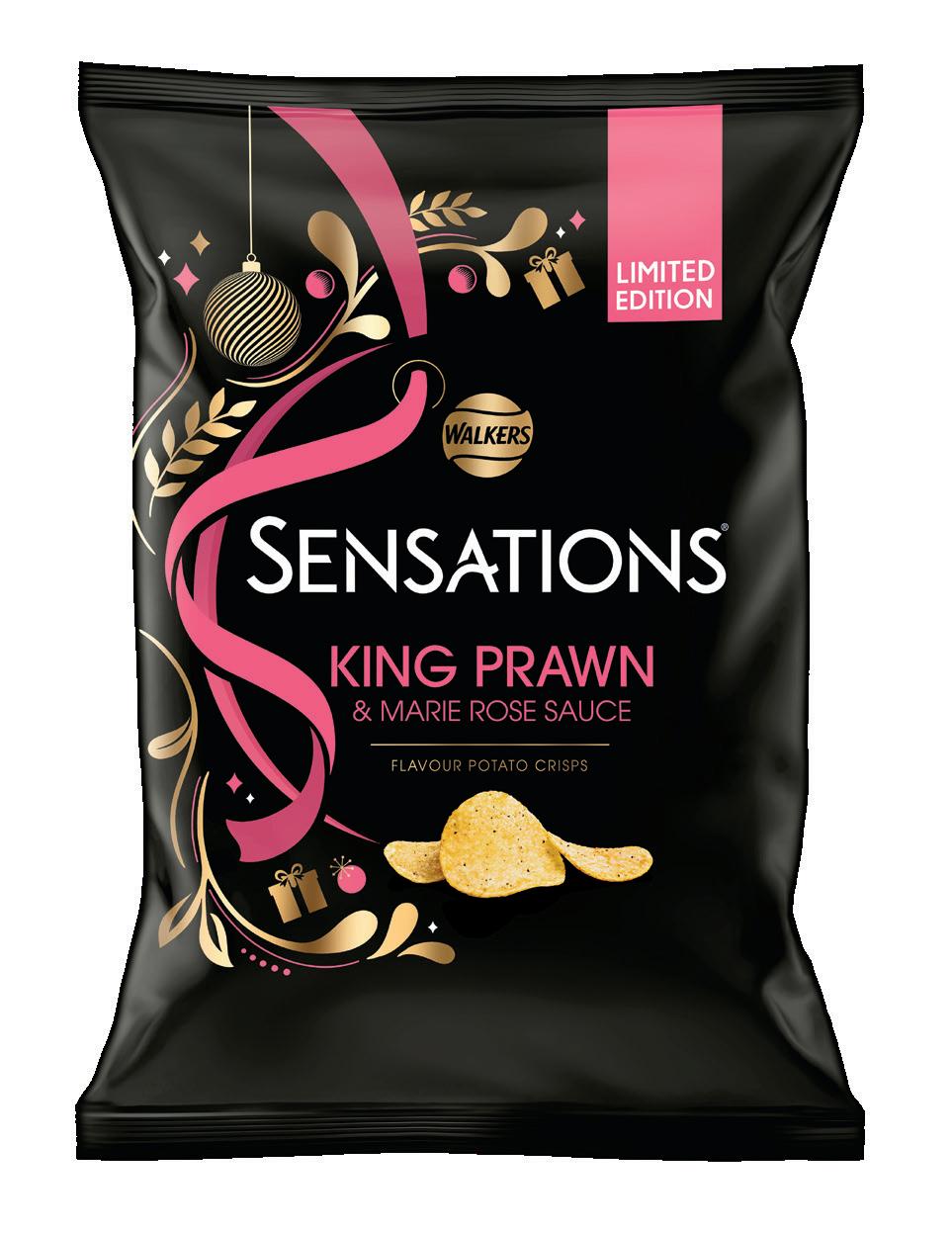
Storey Senior sales director, impulse & field sales, PepsiCo
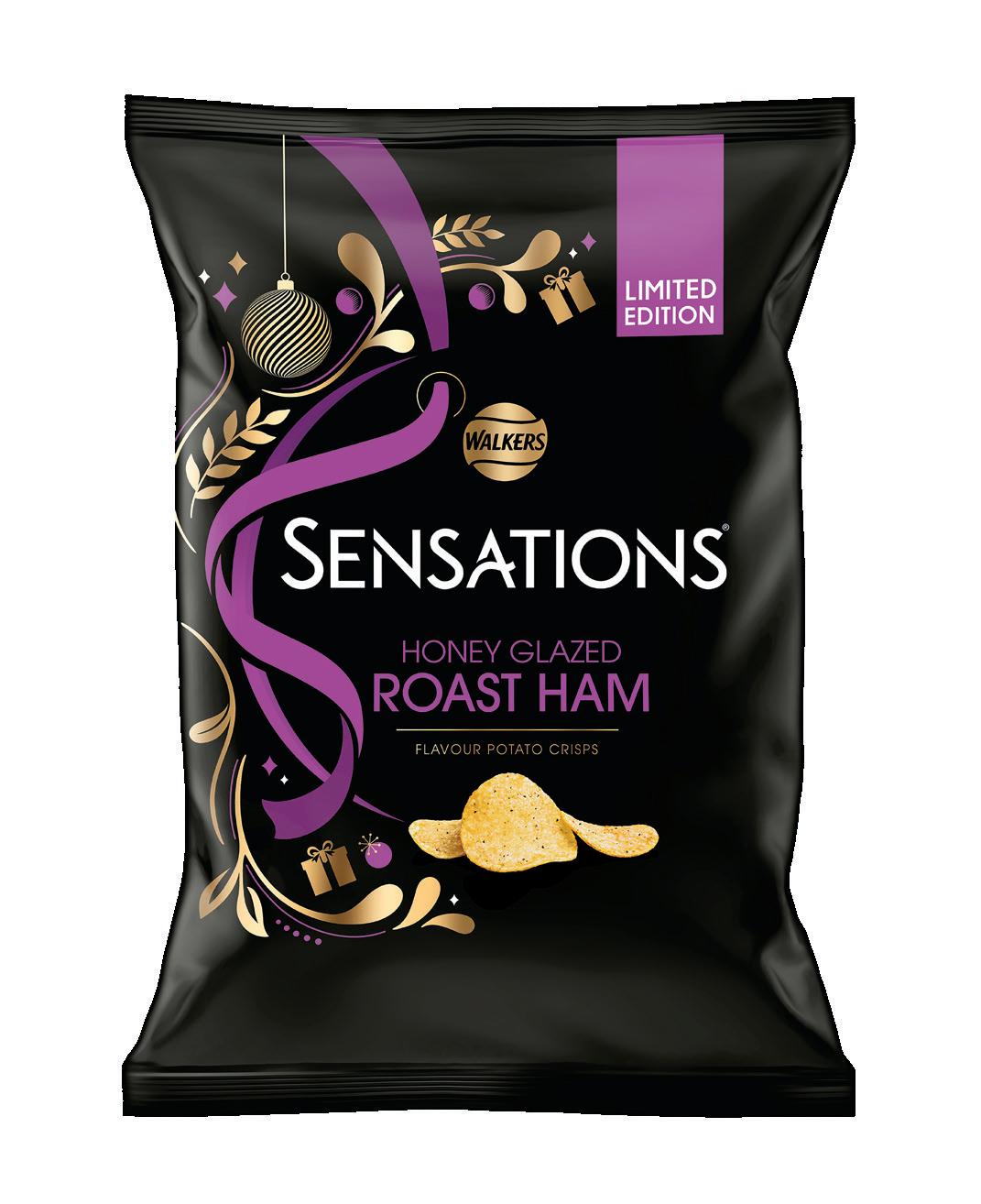

With the festive season approaching, retailers should look to elevate their snacking aisles with premium offerings. Shoppers increase their savoury snacking spend by 36%1 during the Christmas period, so the season presents a huge opportunity to drive sales for nights in. One way retailers can do this is by stocking the latest limited-edition flavours, as insight shows consumers look for these2 .
To help retailers maximise this opportunity, we have launched two limited-edition festive flavours across our Sensations brand. Sensations Honey Glazed Roast Ham has joined our returning Sensations King Prawn & Marie Sauce flavour, which proved a crowd pleaser last year, generating more than £1.2m in value sales3. Both flavours provide retailers with premium, non-HFSS options that help to encourage consumers to trade up when purchasing for their festive nights in.
Retailers can capitalise on the rising popularity of cocktails and “socialmedia-worthy drinks” by offering added extras such as garnishes to elevate the at-home drinking experience, such as Mixologist’s Garden’s ready-to-use fruit garnishes, avail-
Saturday remains the popular time for premium nights
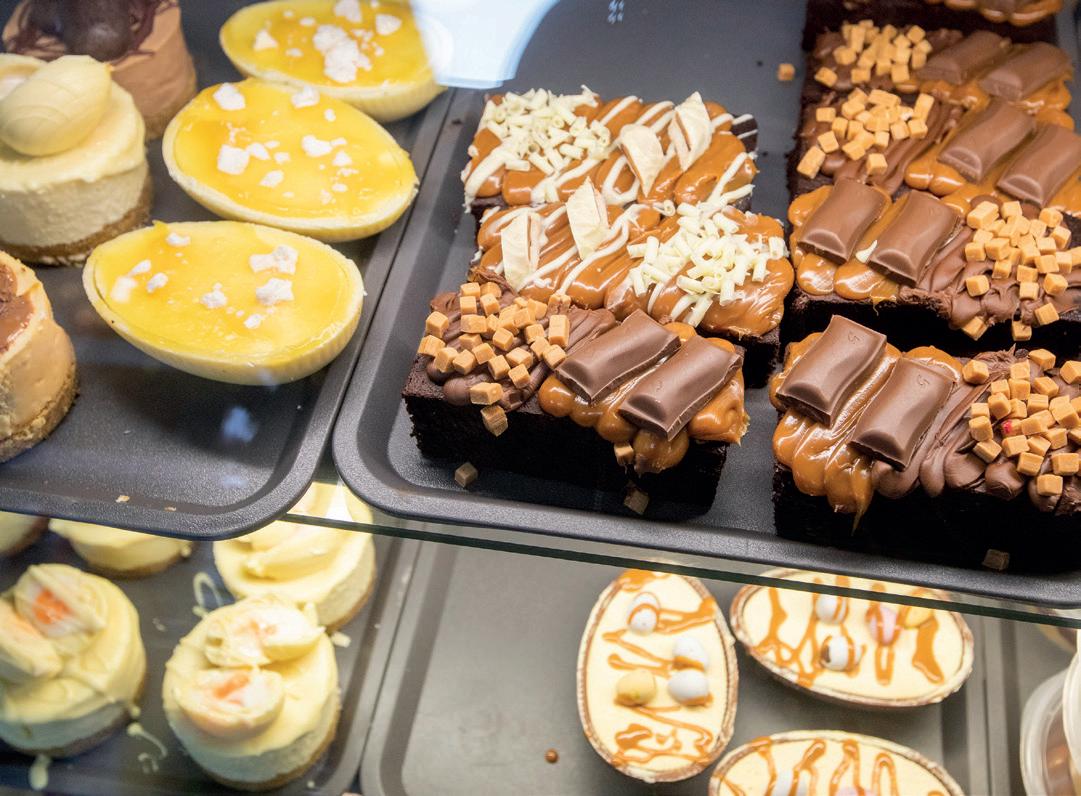
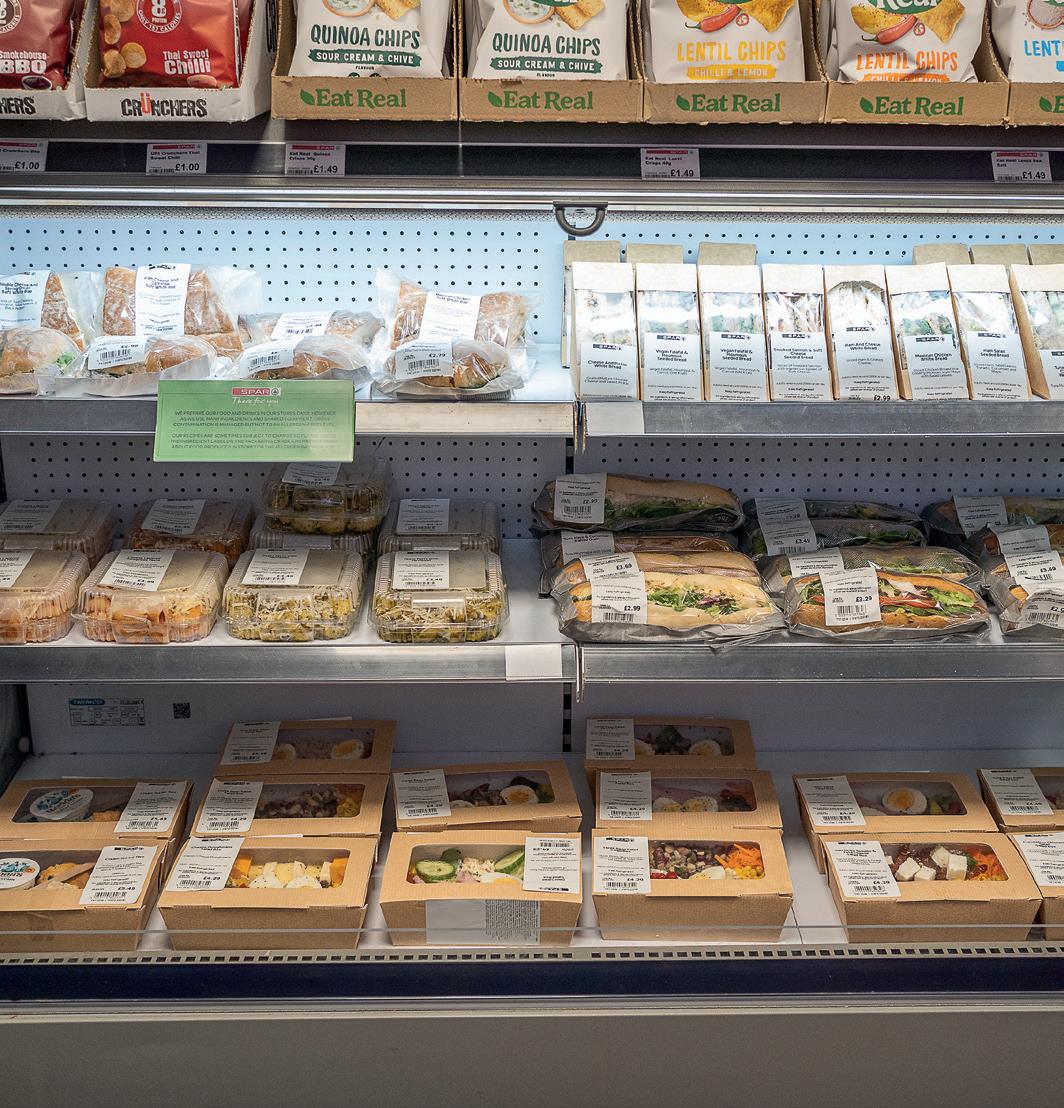

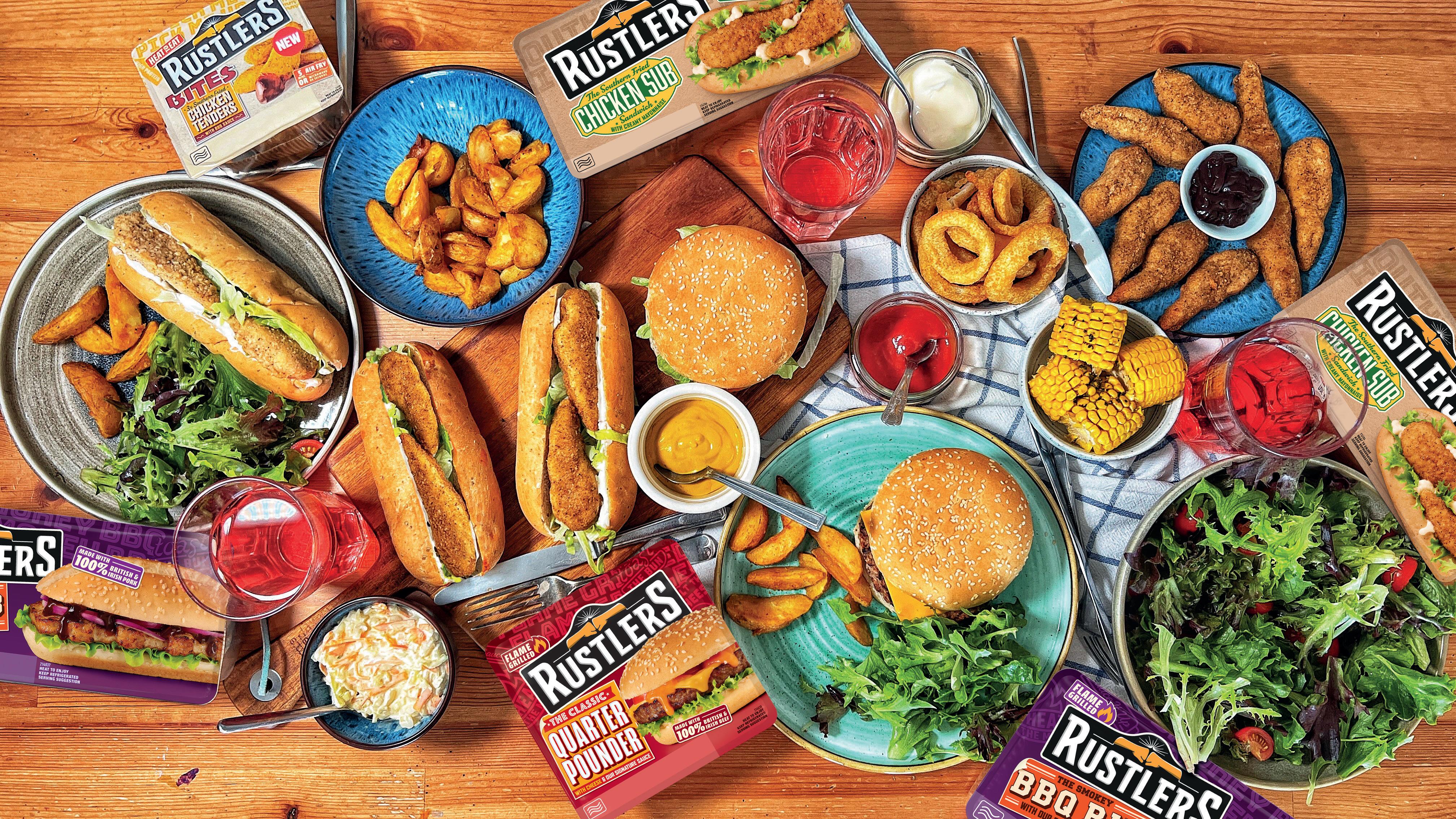
able in 10g pouches retailing at £2. Mcllroy also suggests cross-merchandising premium alcohol-based ready-to-drink (RTD) lines with ‘treat’ snacks to encourage shoppers to trade up.
For Sunder Sandher, owner of S&S One Stop in Leamington Spa, Warwickshire, premium products include locally sourced, exclusive items not available in nearby stores. With 12% of his inventory falling into this category, Sandher has exclusive partnerships with suppliers, making him the sole stockist for items like sausages, eggs and raw hive honey.
“You need to be different from
other stores near you and the only way you can do that is if you have good quality local products,” he says.
Cobb, who sources his fruit, vegetables and meat from local farm shops, says shoppers are willing to pay extra for locally sourced produce. He pairs meat and wine in promotional offers to upsell.
Shingadia sees repeat sales of his ‘restaurant-quality’ frozen ready meals – prepared by in-store chefs – including options like beef bourguignon, fish pie and lasagna. Shoppers often pair these meals with fresh bread and wine, turning a simple dinner into a more elevated experience. Sandher also offers tasting samples of his latest premium food and beverage range to
generate buzz.
In addition to frozen or ready-toeat meal options, retailers should also provide ingredients for cooking from scratch, such as vegetables, meats, herbs, spices, pasta and cooking sauces. Shingadia offers both value and premium sauces, placing them next to the meat and produce section. He believes this strategic placement encourages shoppers to explore new options and builds basket spend.
Desserts are also a crucial component of a retailer’s premium nightsin repertoire. Divine Chocolate’s Dessert Bar range and Just Desserts Yorkshire’s cheesecake sets are great for sharing as well as adding to a meal deal. In the winter, retailers



could also consider stocking hot chocolate or luxury coffee. Additionally, sharing bags of snacking items, like crisps and nuts, can help drive sales and footfall.
Duprey advises retailers to anticipate seasonal drinking patterns for premium nights in. In winter, consumers prefer darker, richer spirits like bourbon, whisky, spiced rum and brandy, often garnished with fruits and spices for a luxurious feel. During Christmas and New Year, champagne, prosecco and sparkling wines become popular. Retailers should offer a variety in both taste and price to meet demand.
Premium nights-in sales can be driven by adhering to four tenets: product availability, strategic positioning, competitive pricing and marketing.
Shingadia advises retailers to intentionally curate their product range. “Look at other suppliers who specialise in premium goods and see what’s the point of difference. But also taper your offering to your demographic,” he says. He suggests observing competitors to learn from their successes and, where appropriate, mirroring their range. Shingadia advises using data to understand what customers are buying, and offering new options to enhance their culinary experience.
Duprey notes that PoS and merchandising on shelf are among the most effective marketing methods for promoting the category. Placing products within close proximity – either in dedicated shelves or freestanding display units – would also help time-pressed consumers make quick decisions.
Shingadia positions premium and unique products at the top of
Observe competitors to learn from their successes
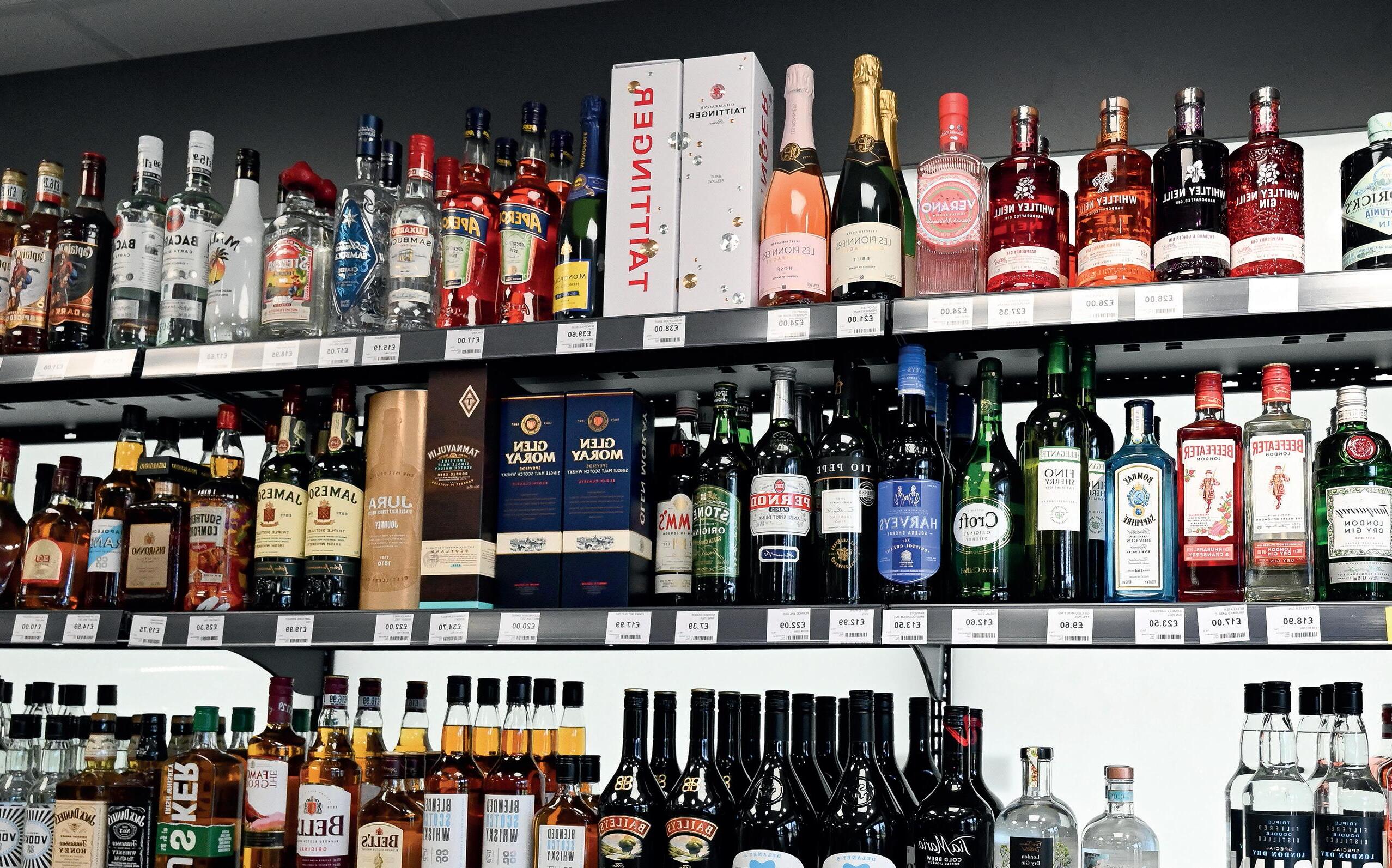

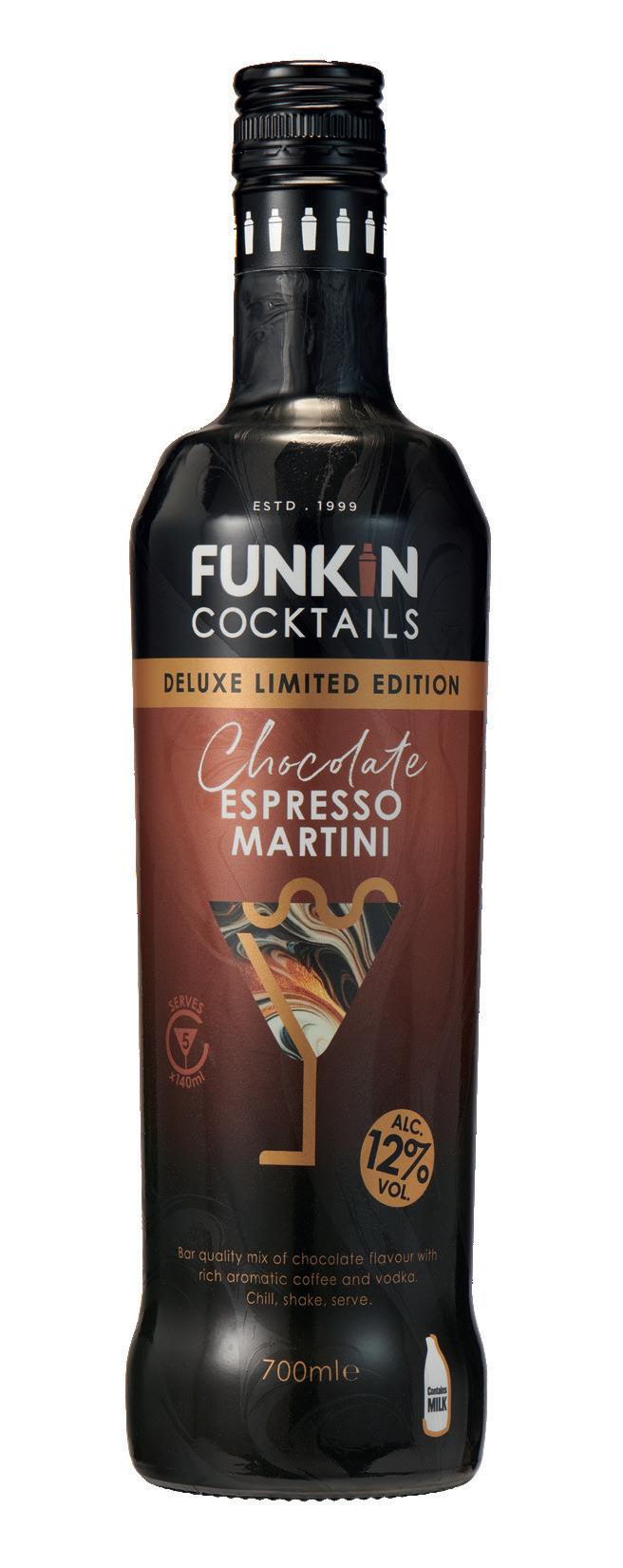





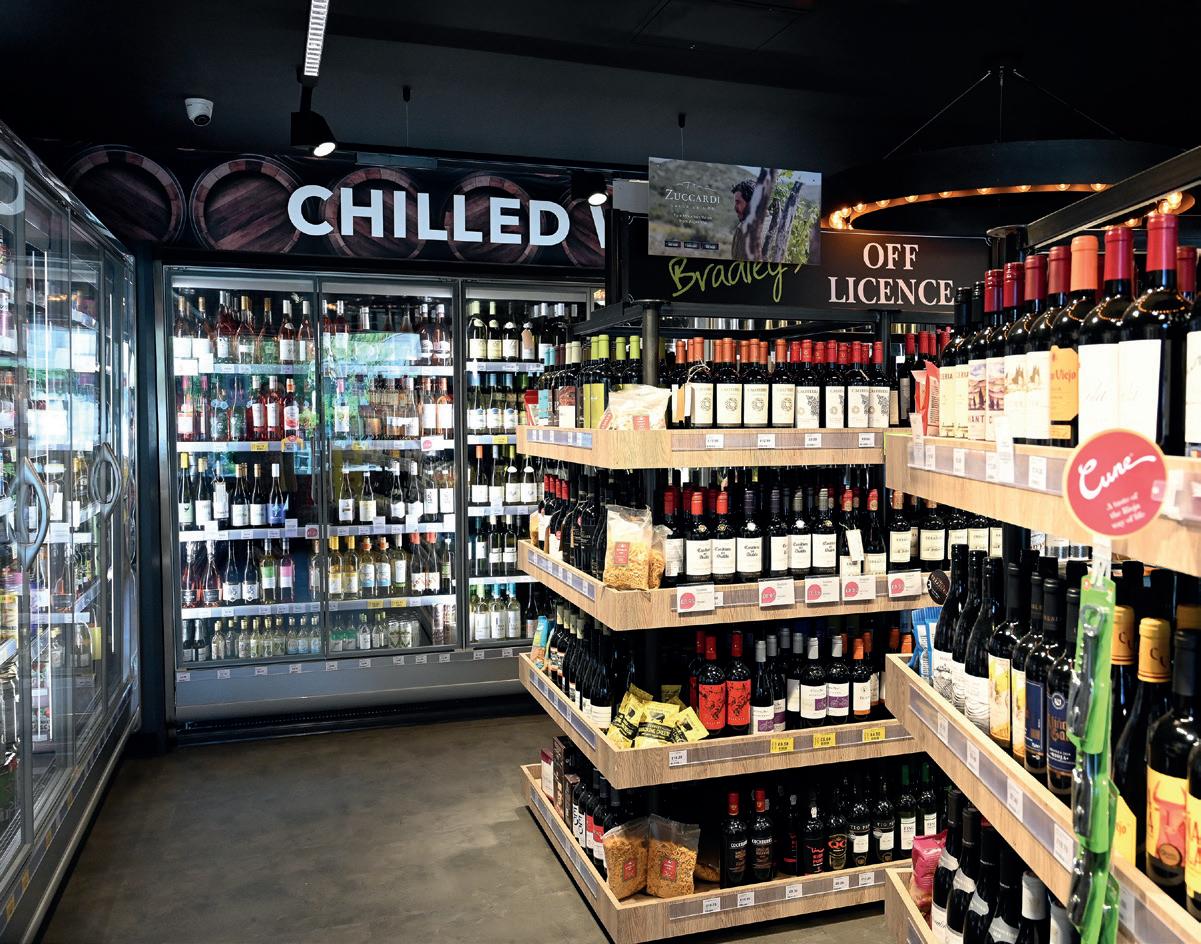
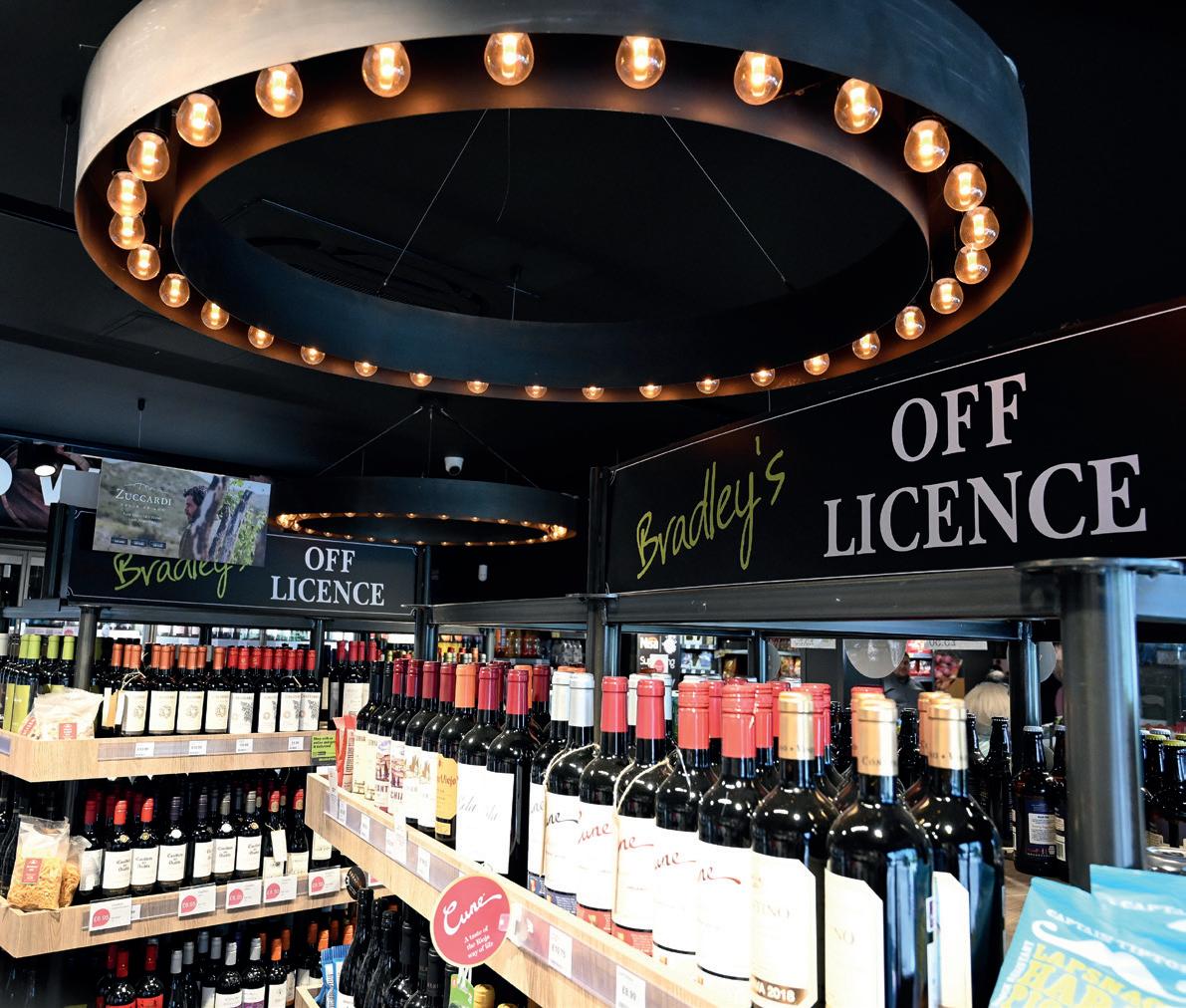
his displays, with value-based items lower down, to encourage higher basket spend. This strategy is tailored to his affluent customer base.
Retailers could also position their premium night-in section towards the front of the store to inspire higher spending early in the shopping experience, before budget concerns set in. Additionally, impulse buys should be prominently highlighted to attract consumers as they shop.
“You may also want to put together a selection of bundle deals on drinks, snacks, crisps and confectionery – everything you need to elevate a big night in to a premium night in,” says McIlroy. Duprey suggests that when marketing the at-home premium

experience, retailers should highlight how consumers can recreate their favourite restaurant food and drinks. This can be enhanced by offering accessories including cocktail shakers, glassware, straws and premium mixers.
Singh and Sandher use social media to tap into their local audiences. Cobb, on the other hand, emphasises physical marketing, such as including leaflets with the day’s newspaper, mainly due to the age range of his customer base.
“Our demographic isn’t necessarily the type that would be on Instagram or Facebook,” says Cobb. “Because that demographic generally buys a newspaper, we find that we get more back from physical marketing.” l



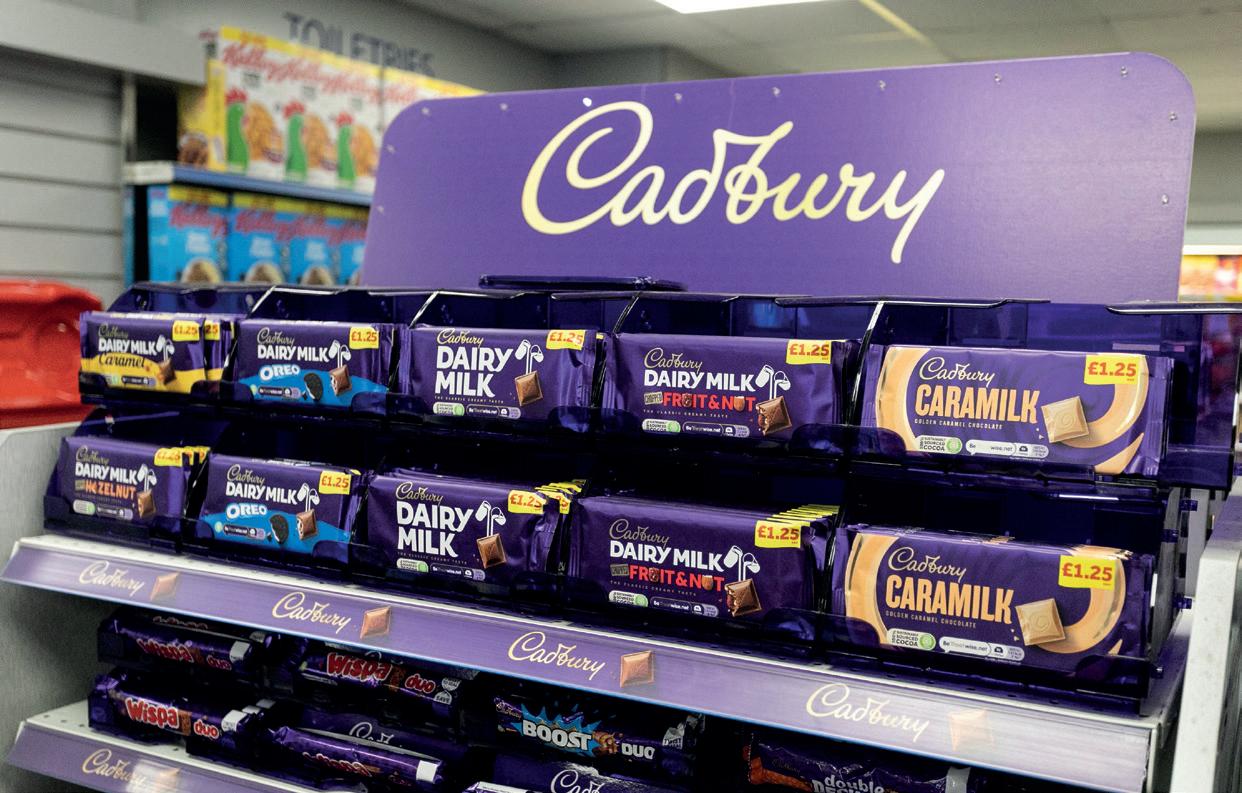
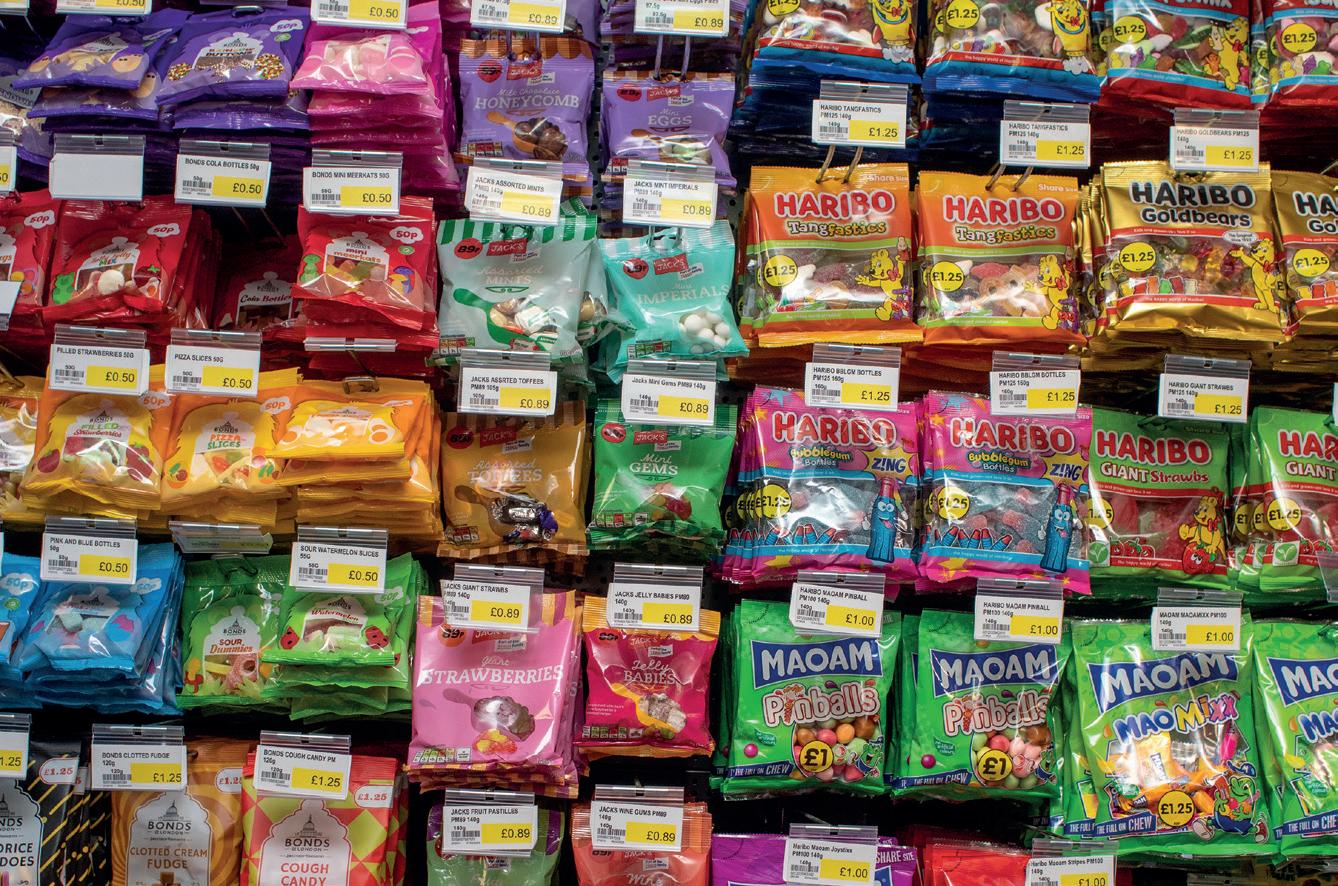
platforms like TikTok, Instagram, and YouTube for product trends, especially among younger consumers.
Confectionery is a cornerstone of convenience retailers’ sales, a nd can deliver strong margins and high sales volume. Retailers that are able to balance core ranges of bestsellers with trending new lines and then merchandise them strategically so more customers see them can drive considerable growth.
Staying on top of emerging trends is crucial for increasing confectionery sales. Social media has become a
driving force in determining what customers are buying, particularly younger shoppers.
Nishi Patel, owner of Londis Bexley Park in Dartford, Kent, has leveraged this by focusing on trendy, social media-driven products. Patel says: “If there is a certain product circulating on social media, we include it on till fixtures or by the front of the store.”
One of the most effective ways to boost confectionery sales is through diversification. Offering a variety of products – from traditional brands to imported US and international lines – retailers can appeal to a broader range of customers.
Imtiyaz Mamode, of Wych Lane Premier in Gosport, Hampshire, says he’s seen strong demand for international confectionery, particularly from the US, East Asia, Turkey, and Mexico. In fact, Mamode has a designated area for international products, stocking more than 400 lines of US snacks, including confectionery favourites.
Mamode’s strategy of offering such a variety has not only attracted a wider customer base but has also improved overall store turnover by 20%, he says.
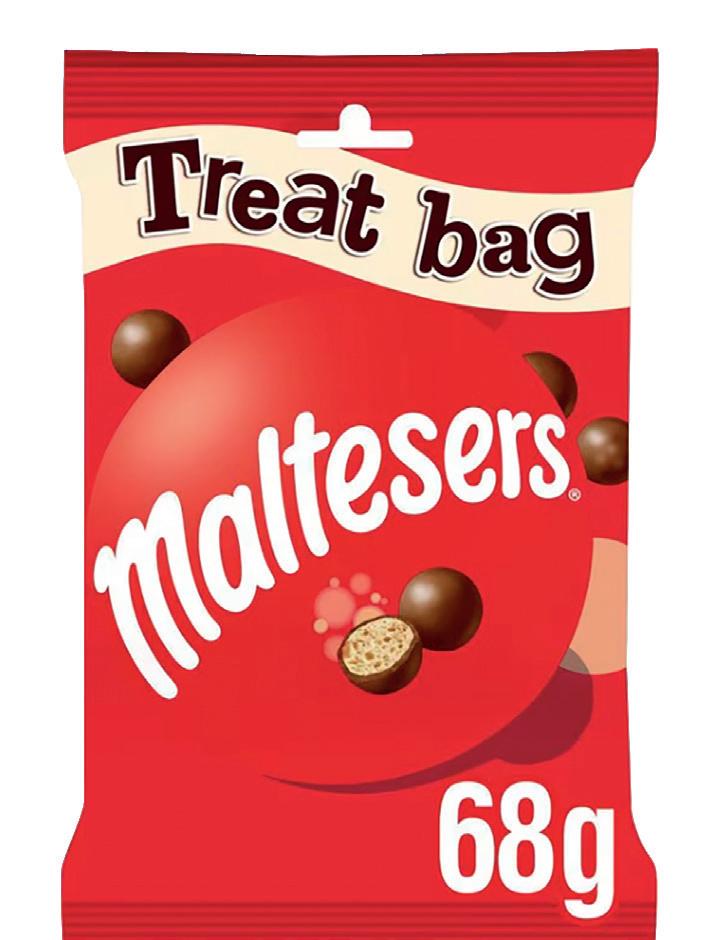
By positioning these products in high-visibility areas, Patel has seen a 15% growth in confectionery sales. A key takeaway here is to monitor
If a product is on social media, we include it on
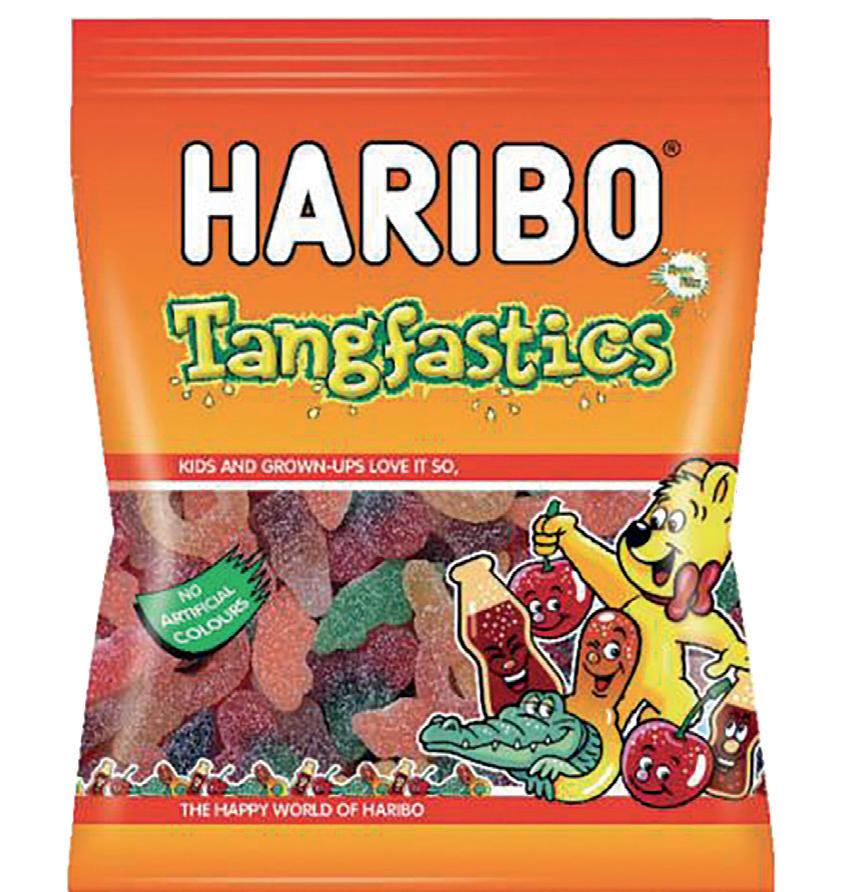
US confectionery, in particular, has proven to be a powerful footfall driver for many retailers this year. Ruban Kanagasaban, owner of Londis Fairfax in Kidlington, Oxfordshire, reports that his US confectionery sales have nearly doubled since




THE TOP FIVE PRODUCTS WITH AVERAGE WEEKLY SALES OVER £6.50*
range and buy products, and they’re bringing their parents with them, who then can’t resist buying lots of other things.”
Data from RN’s sister publication, What to Stock, reveals the key products driving sales in the confectionery category. For retailers, focusing on top performers in sugar confectionery, sharing, chocolate bars and chocolate-block subcategories can optimise sales and profitability.
The data shows that impulse














purchases are the cornerstone of the sugar confectionery category, however, with most top sellers priced under £1.50.
Popular items like Brain Licker Candy Drink Raspberry 60ml and Bazooka Push Pop Mega 30g lead in weekly sales, with margins of around 33% and 25% respectively, making them ideal for retailers aiming to drive profit.
Positioned at the till or in hightraffic areas, these single-serve, affordable products can boost basket spend significantly.






















What to Stock data also demonstrates that the sharing category continues to thrive, particularly with popular brands like Maltesers 68g, which leads the category with weekly sales of 10.50 units and a margin of around 21%.
Close behind, Haribo Tangfastics 140g & 160g and Cadbury Dairy Milk Giant Buttons 95g & 119g average weekly sales of 8.67 and 8.73 units, proving the high demand for both gummy and chocolate options.
For retailers looking to optimise
































































Mark Roberts
Marketing & trade marketing director, Perfetti Van Melle
1. Stock a variety of flavours, textures and formats to offer choice in the leading brands –they provide peace of mind and always sell first.
2. Add signage and PoS for a standout fixture that builds visibility. Talk to your rep about deals to advertise at the till, for example two-for-one.
3. Include sugar-free products in your offering.
4. Visibility is key for sales. Shoppers respond well to cross merchandised fixtures and clearly signposted sections that target specific occasions.
5. Counter-top units should ideally sit at arm’s reach from the main till point to drive impulse sales.
sales, the data shows that Haribo Tangfastics stands out, with the highest weekly profit in the category at £2.37 and a 27%. Maltesers, while delivering a lower margin, offers a reliable £2.24 weekly profit.
By placing these high-demand sharing products near entrances or high-traffic sections, retailers can encourage bulk purchases and help drive overall confectionery sales.
The data shows that chocolate bar formats are a top-performing confectionery subcategory across convenience.
Kinder Bueno 21.5g 2pk holds the top spot with weekly sales of 6.86 units and a margin of 32%, bringing retailers an average weekly profit of £2.20. Cadbury Twirl 21.5g five-pack closely follows, with 6.29 units sold per week. These bars are delivering consistent sales, showing that familiar products keep customers returning.
Chocolate blocks, however, dominate the confectionery category in terms of volume and profit. The data indicates that Cadbury Dairy Milk 95g & 110g is the bestselling block,
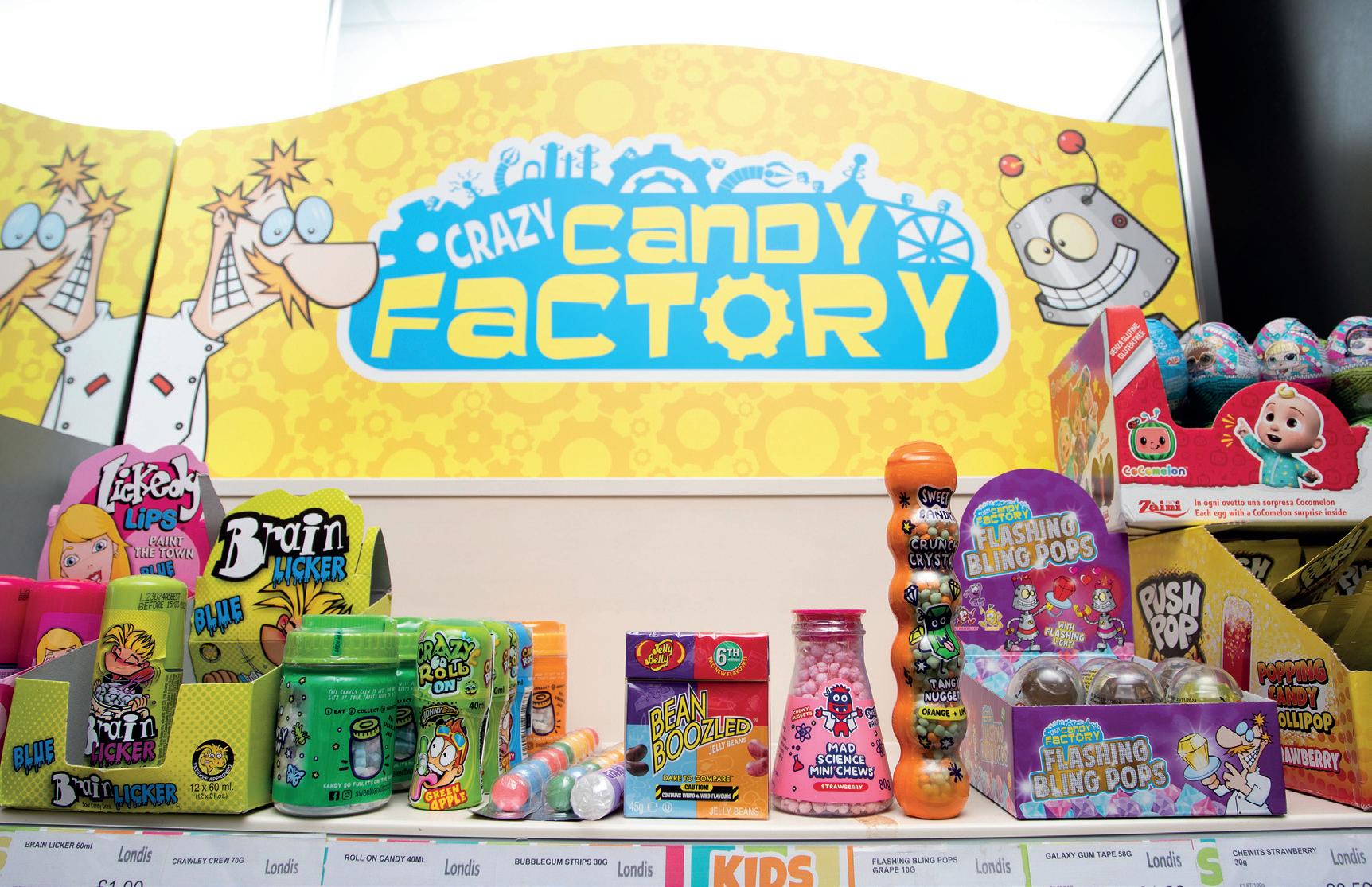
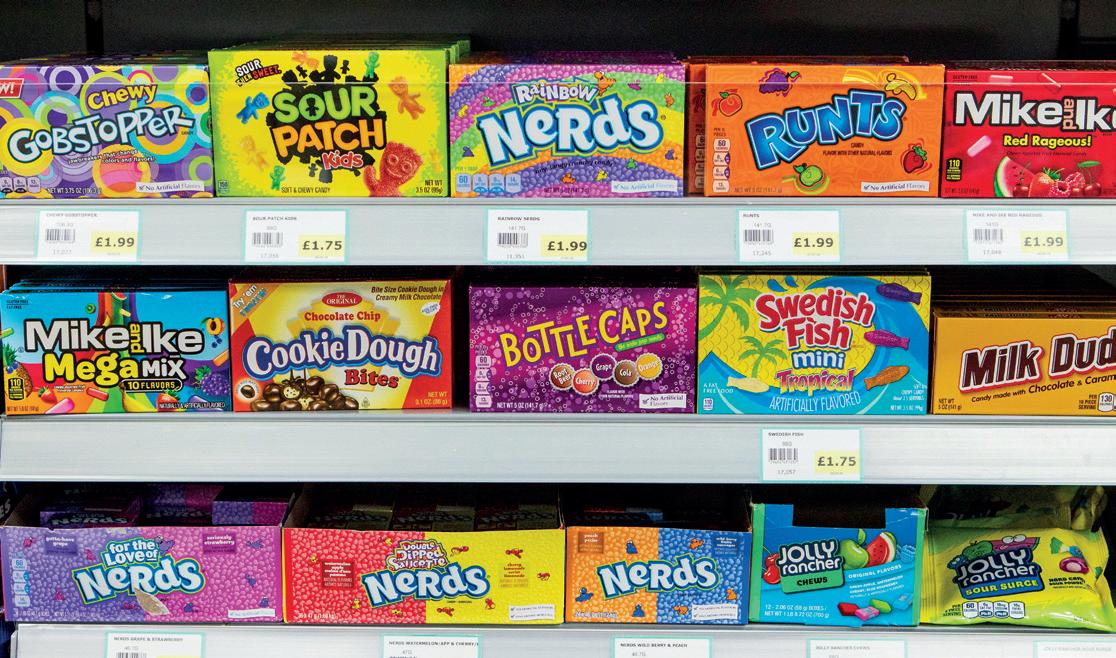
but products like Galaxy 100g & 110g and Cadbury Dairy Milk Caramel 120g, Cadbury Dairy Milk Fruit & Nut and Galaxy Caramel are all also profit drivers for convenience stores.
These products are widely available, stocked in over 95% of stores, showing they are ideal for building a core confectionery range that meets broad customer appeal.
By focusing on these high performers while refreshing stock with trending items, retailers can maintain a profitable and attractive confectionery selection all-yearround.
As we approach Christmas, seasonal pushes or bundling promotions can drive sales. Seasonal confectionery can appeal to customers on sharing and gifting shopping missions.
Multi-buy promotions, especially on single-serve items like chocolate bars and sugar confectionery, can be very effective in driving sales. Deals like ‘3 for £1’ or ‘Buy one, get one half price’ encourage customers to purchase additional items.
Positioning these multi-buy items at the till or entrance where they are most visible creates an easy, lastminute buy that can quickly boost basket spend.
This strategy is especially ef-

fective for products that are circulating on social media or are part of limited-edition releases, as their visibility can trigger impulse purchases. Patel highlights this approach, stating that if a product is trending online, he ensures it is displayed right at the front of the store.
Retailers should also try to create visually engaging displays for popular confectionery items, perhaps highlighting new or seasonal products with colourful signage or promotional banners.
By regularly reviewing sales data, retailers can know when to adjust their fixtures based on customer preferences. For instance, tracking which products are moving fastest can indicate a strong customer preference, allowing retailers to double down on bestsellers, or look to grow the range with similar lines or lines from the same brand
By being flexible when it comes to confectionery ranging, retailers can keep their inventory fresh and aligned with actual demand, ensuring that shelf space is maximised for sales. l
l Swizzels has launched ‘Naughty & Nice’ Squashies in time for Christmas. The elf-shaped Squashies are available to purchase now, with an RRP of £1.15, sold in cases of 12.
l Bebeto has released its new range of Freeze Dried Sweets inspired by recent TikTok trends that have led to the sweets going viral. The range is available to Spar retailers and via Parfetts.
l Reese’s has expanded its UK portfolio with the launch of Reese’s Fast Break Bar. The 51g bar is available via most wholesalers, with an RRP of £1.15.
l Bobby’s Foods has released three new lines including Blue Razz Dreams, Fruit Fools and Vimto Fried Eggs. Each sharing bag has an RRP of £1.25.
l Chupa Chups has launched its first-ever advent calendar, available to independent retailers via World of Sweets and Spar wholesaler CJ Lang. The calendar has a mixture of lollipops, jellies and bubblegum, with an RRP of £6.99.
This year’s Christmas special of the popular food magazine is a bumper issue packed with festive ideas and includes a free recipe calendar for 2025

What makes the Christmas special of Good Food special?
This year’s Good Food Christmas special is all about making new Christmas memories. We’ve increased our pagination by 64 pages to give readers a bumper 200-plus-page issue packed with festive recipe inspiration including ideas for the big day, show-stopping mains, new twists on favourite sides and dreamy desserts.
The Christmas special also comes with a 2025 Recipe Calendar featuring planet-friendlier recipes that will help readers reduce their impact on the environment next year.
How have previous Christmas specials performed at newsstand?
This is our biggest-selling issue of the year, and, on average, it sells three-tofour times as many copies as regular issues.
Including its various value packs, last year’s Christmas generated more than £500,000 in retail sales value.
As well as being our biggest seller, it is our best

edition in terms of yearon-year performance.

What should retailers be doing to maximise sales of this issue?
We encourage retailers to stock the issue at the front of shelves or on tills. The issue comes in a glossy envelope wrap to help it stand out on shelves. For the second year, we’ve gold-foil-stamped the Good Food masthead onto the envelope to make it look even more eye-catching.
What are you doing to support independent retailers stocking the title?
For the first time this year, we’ve identified our topselling 500 independent retailers and sent them a window poster to promote
the issue, with a cover letter thanking them for their support and help over the past 12 months.
Any other independent retailers that would like a window poster should contact us on goodfood@ immediate.co.uk and we’ll send one out.
Can you tell us something from inside this issue that will get customers excited?
We’re making the sides the star of the show. We’ve created the best festive sides our readers will have ever tasted, with extra-crunchy roast potatoes, rustic sausage, apple-and-cranberry stuffing, kale, leek, cheddar-and-goat’s-cheese gratin, and brown-butterand-bay bread sauce.


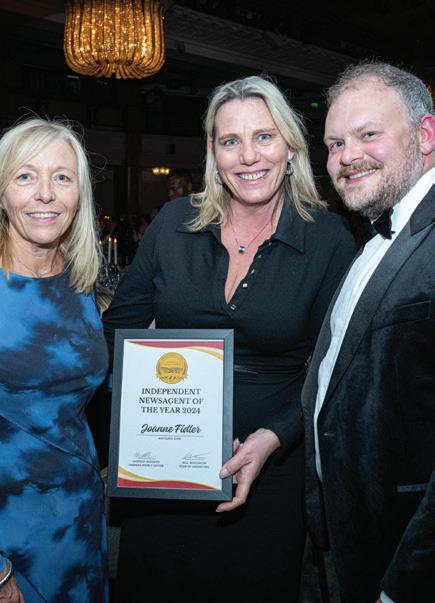
Joanne Fidler, Farmers Weekly Independent Retailer of the Year 2024
We are thrilled to have won this award. It’s a true recognition of the hard work and dedication the team puts into serving our community every day.
Our staff feel incredibly proud to be part of a local newsagency that means so much to so many, from retired farmers to the next generation carrying on the agricultural tradition. Winning this award reinforces our commitment to providing essential resources, a sense of connection and a welcoming place for all. Thank you to everyone who supports us – this win is for you, too.
In my application to be Farmers Weekly’s Independent Retailer of the Year, I said I ran a small newsagency located at the foot of the Yorkshire Wolds that serves a community of farmers.
We stock and sell Farmers Weekly every week. This publication is essential for our customers, providing them with the latest agricultural news, insight and innovations.
Our commitment to offering Farmers Weekly helps the farming community around us. It’s a resource that helps them stay informed, make better decisions and feel connected to the broader agricultural industry.
Winning this competition is not only a tremendous honour, but also a recognition of the hard work and dedication we put into serving our community.




l Anthem has launched two yearbooks for actors, with cover stars Pedro Pascal and Sam Heughan.
l The magazine is packed with features on the Outlander star and the show itself, along with activities such as brainteasers and colouring.
l This festive royal special is a bumper issue with over 100 pages packed with all the highs and lows of the past year for the royal family.
l The magazine also comes with a 45-page photo album of everything the royals got up to in 2024, giving it added value for customers.

l This classic comic magazine is popular with comic-book fans for its nostalgic style and traditional format.
l This issue includes the continuation of comic Major Rakhana’s Mars Mission, as well as WesterNoir and The Clockwork Cavalier.
l This issue of Mojo looks back at the past year in music, with a definitive review of the biggest moments and greatest hits of the past year.
l Every copy comes free with a 15-track CD, adding shelf appeal and boosting the value to customers.

l Puss Puss is an international, biannual magazine and online platform for culture, fashion, music and cat lovers.
l It features interviews, articles and fashion shoots by the most exciting established and upand-coming talent from around the world.

l This fashion and lifestyle magazine is focused on classic, distinctive style for men.
l This issue features interviews with designer Oliver Spencer, the managing director of Henry Poole & Co and the mind behind watches like Goldberger and Auro Montanari.
with Total Film, Empire
5059464383001

Distributor Seymour Display with Natural Parent, Permaculture Barcode 9771479257059
Distributor Marketforce Display with Commando, Otaku Barcode 9772753419019
with Grazia, V
9772056314011
What is special about the title?
We have a lot of specialist socialist titles, but green titles sell well alongside them.
Who buys it?
Parents who care about politics and environmentalism, and want to implement that in their lifestyle. Our clientele is mostly students, but some titles do well with older readers.












































































